On this information, you’ll discover ways to improve your SEO (Search engine marketing) or pay-per-click (PPC) technique with competitor key phrase analysis.
And in the end get extra high-quality visitors from serps.
What Are Competitor Key phrases?
Competitor key phrases are search phrases that rival web sites rank for in serps like Google. Both within the natural (unpaid) or sponsored (paid) outcomes.
For instance, when you compete with 1-800-Flowers.com, then “flower supply” is a competitor key phrase.
The method of discovering and analyzing opponents’ key phrases is called competitor key phrase analysis. It may well provide help to:
- Perceive what related audiences seek for
- Determine alternatives to outperform rivals and divert visitors to your website
- Keep away from concentrating on key phrases which are too tough (or costly) to seem for
- Set benchmarks in your search engine marketing technique
How you can Discover Rivals’ Key phrases
To seek out opponents’ key phrases, you want entry to a website key phrase database like Semrush’s.
We advocate that you just search it with the Keyword Gap device. As a result of it allows you to examine your Google rankings towards a number of opponents’ rankings, it’s straightforward to identify one of the best alternatives.
You’ll be able to examine:
- Natural key phrases: Key phrases that set off a top-100 natural end result for a website in your evaluation. This selection is greatest when you’re doing keyword research for SEO (i.e., to optimize content material in your website).
- Paid key phrases: Key phrases that set off a sponsored end result for a website in your evaluation. That is the best choice when you’re doing PPC keyword research (i.e., discovering key phrases for Google Ads or different search engine promoting campaigns).
- PLA key phrases: Key phrases that set off a product listing ad (PLA) for a website in your evaluation. That is the best choice when you’re planning to promote by means of Google Shopping or comparable.
Right here’s what every end result kind appears to be like like on Google:
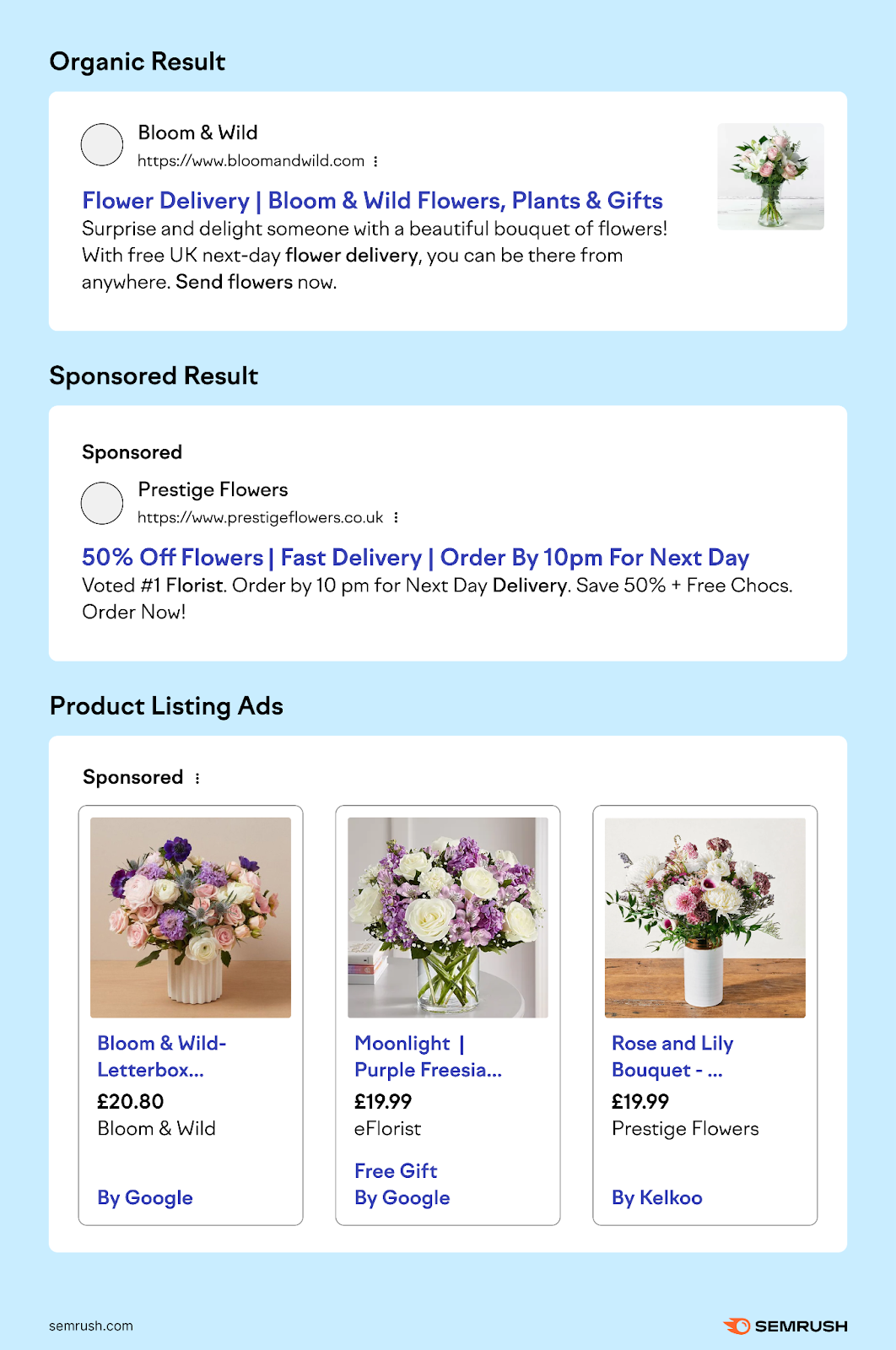
We’ll additionally clarify find out how to take an in-depth take a look at a particular competitor’s natural, paid, and PLA key phrases.
Examine Your Rankings Towards Rivals’ Rankings
To check your rankings towards these of your opponents’, go to the Keyword Gap device.
Enter your area and as much as 4 opponents’ domains. And select which forms of key phrases you need to take a look at.
Then, choose your goal nation and click on “Examine.”
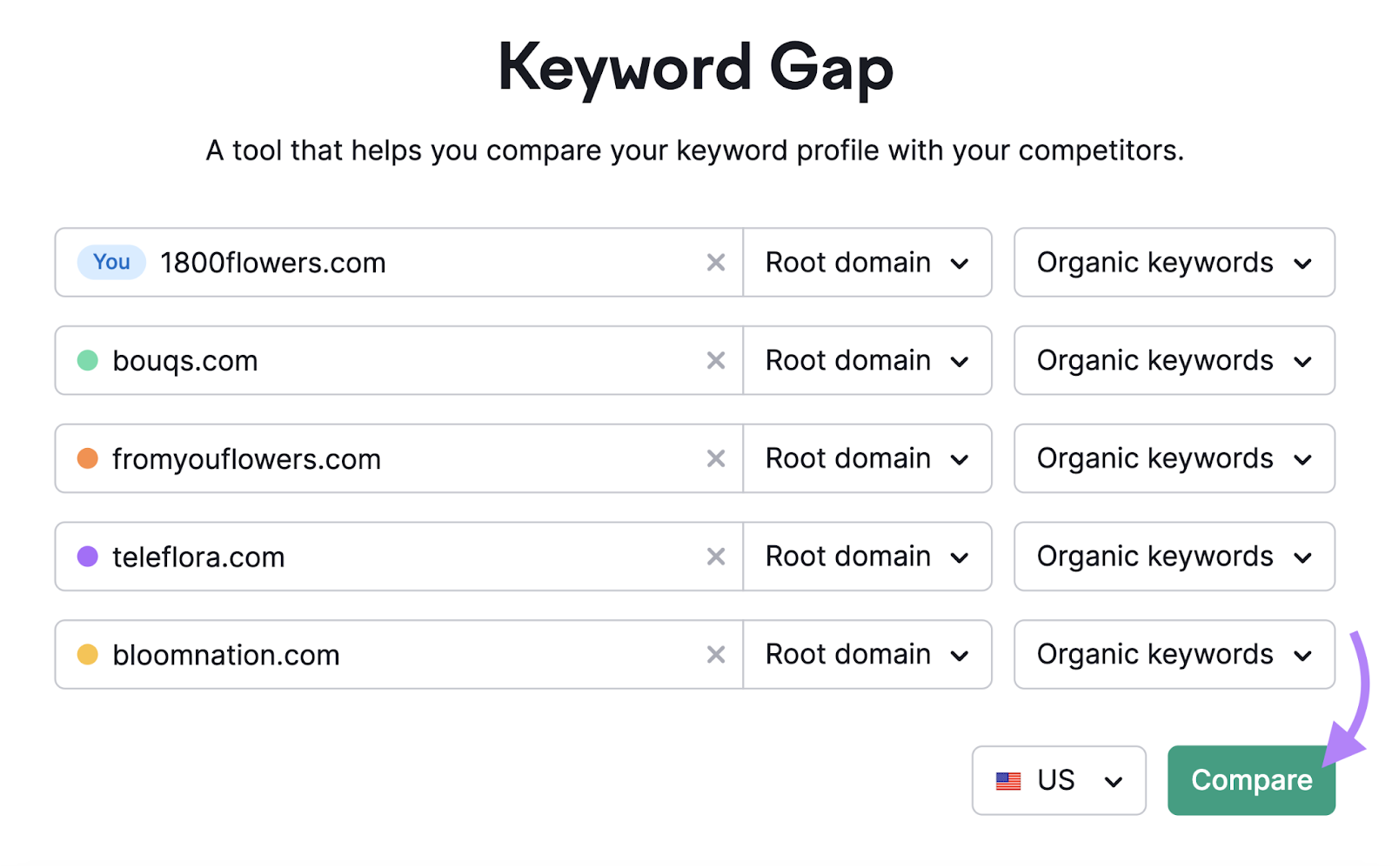
Scroll right down to the desk to see your and your opponents’ key phrase knowledge.
The “Weak” tab reveals the place you’re rating decrease than all of your opponents.
Which means searchers are prone to go to a competitor over you. So, it’s possible you’ll need to attempt to improve your rankings. (We’ll speak extra about how to do that later.)
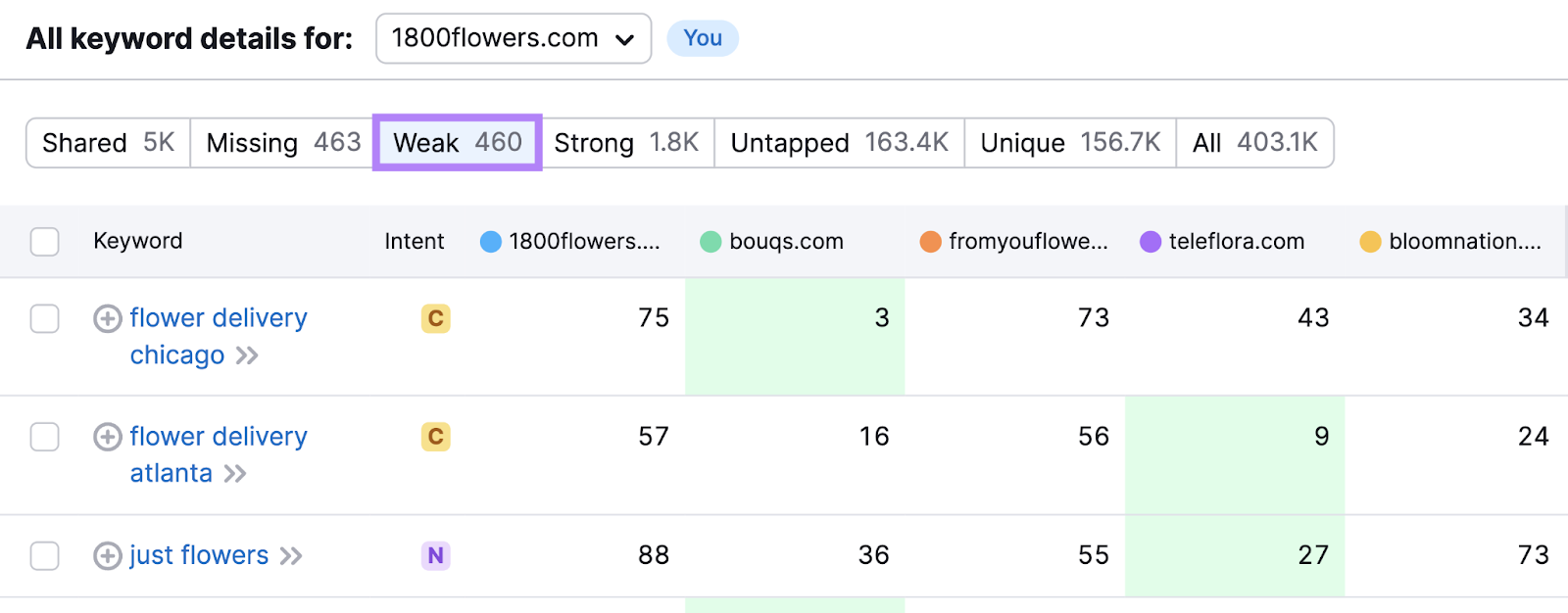
The “Lacking” tab reveals key phrases that every one rivals rank for however you don’t. And “Untapped” reveals key phrases that no less than one rival ranks for however you don’t.
In these sections, it’s possible you’ll discover related and invaluable key phrases you’re lacking out on.
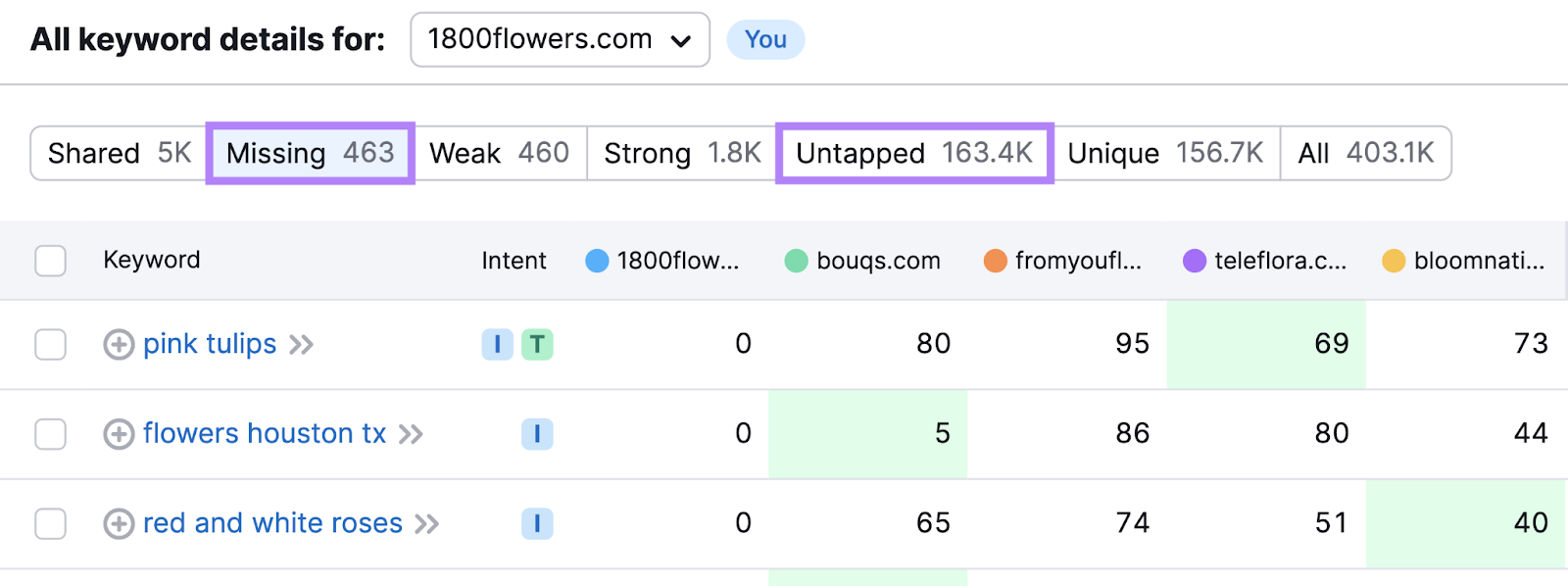
The “Sturdy” tab reveals the place you’re rating increased than all of your opponents. Whereas “Distinctive” reveals the place you’re the one one of many group rating.
These key phrases offer you a aggressive benefit. And also you may be capable of strengthen this benefit by pursuing even increased rankings for these search phrases.
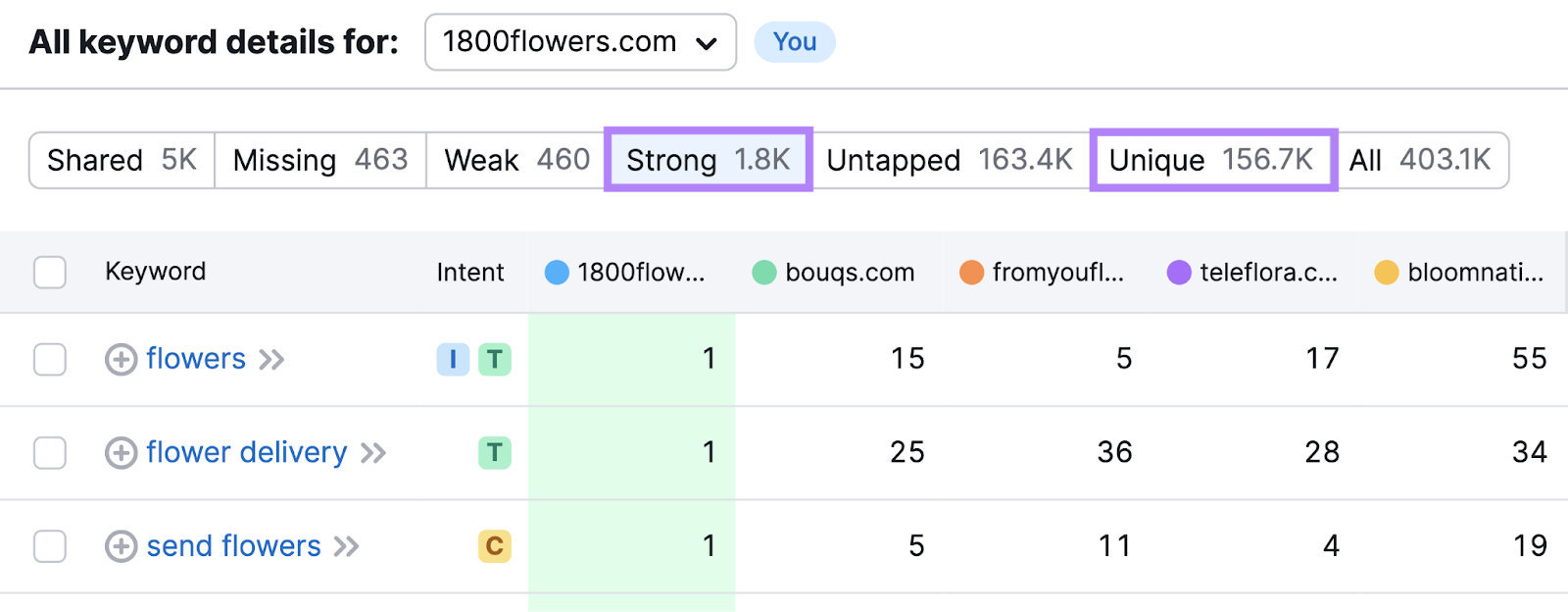
Within the following sections, we’ll clarify find out how to discover natural, paid, and PLA key phrases for a particular competitor’s website. That is helpful if you wish to conduct a extra in-depth evaluation.
After that, you’ll discover ways to select one of the best competitor key phrases in your marketing strategy.
Examine Natural Key phrases for a Rival Web site
You’ll be able to verify a competitor’s unpaid key phrase rankings with the Organic Research device.
Simply enter their area, select your goal location, and click on “Search.”
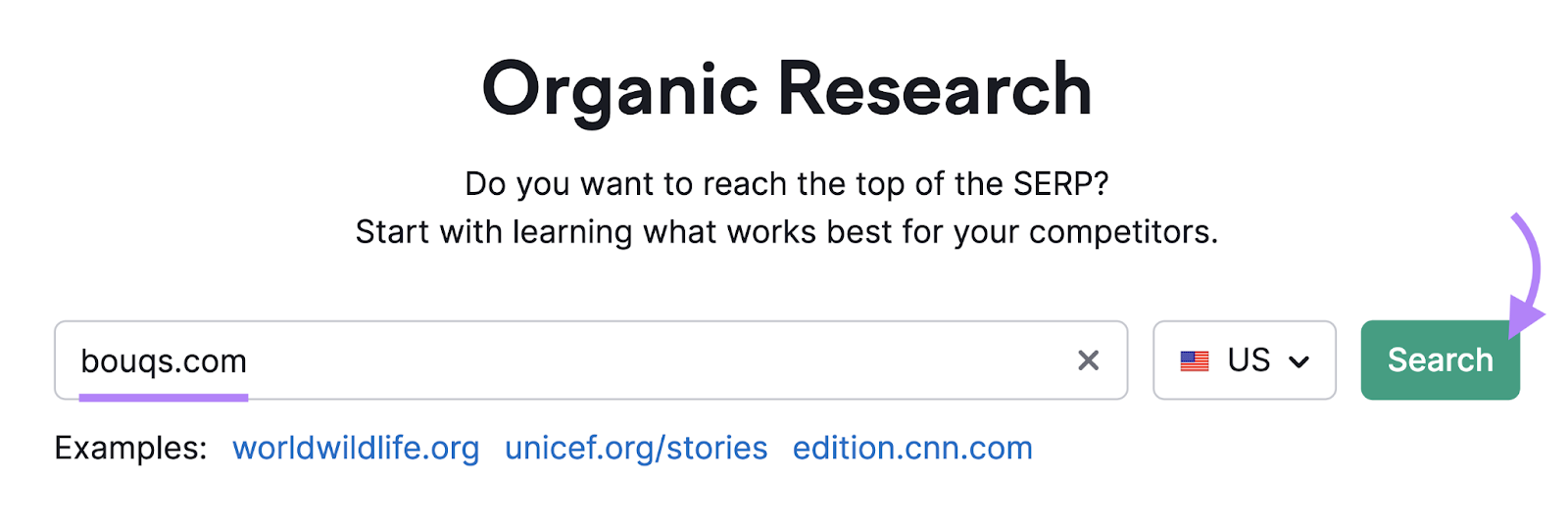
Subsequent, open the “Positions” report and scroll right down to the “Natural Search Positions” desk.
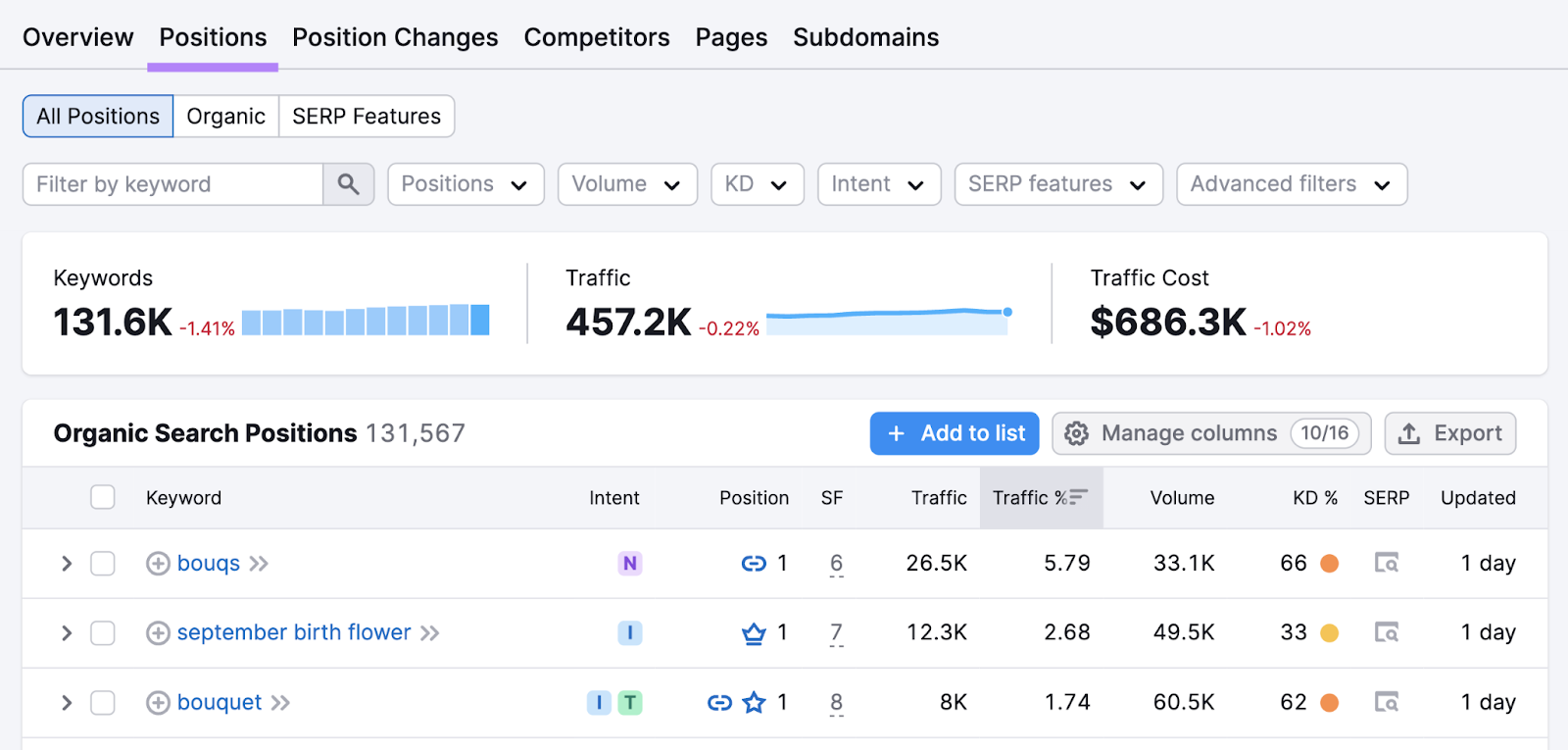
The “Place” column reveals the location’s natural rating for every key phrase. (As of the date on the high.)
For instance, this “1” implies that competitor’s end result seems within the high natural place for “month-to-month flower supply service”:

If you happen to see an icon within the “Positions” column, it means the location has secured a particular function on the search engine outcomes web page known as a SERP feature.
For instance, this reveals that the competitor’s website is featured within the Individuals additionally ask field for “daffodils”:

Right here’s what that end result appears to be like like within the search engine outcomes web page (SERP):
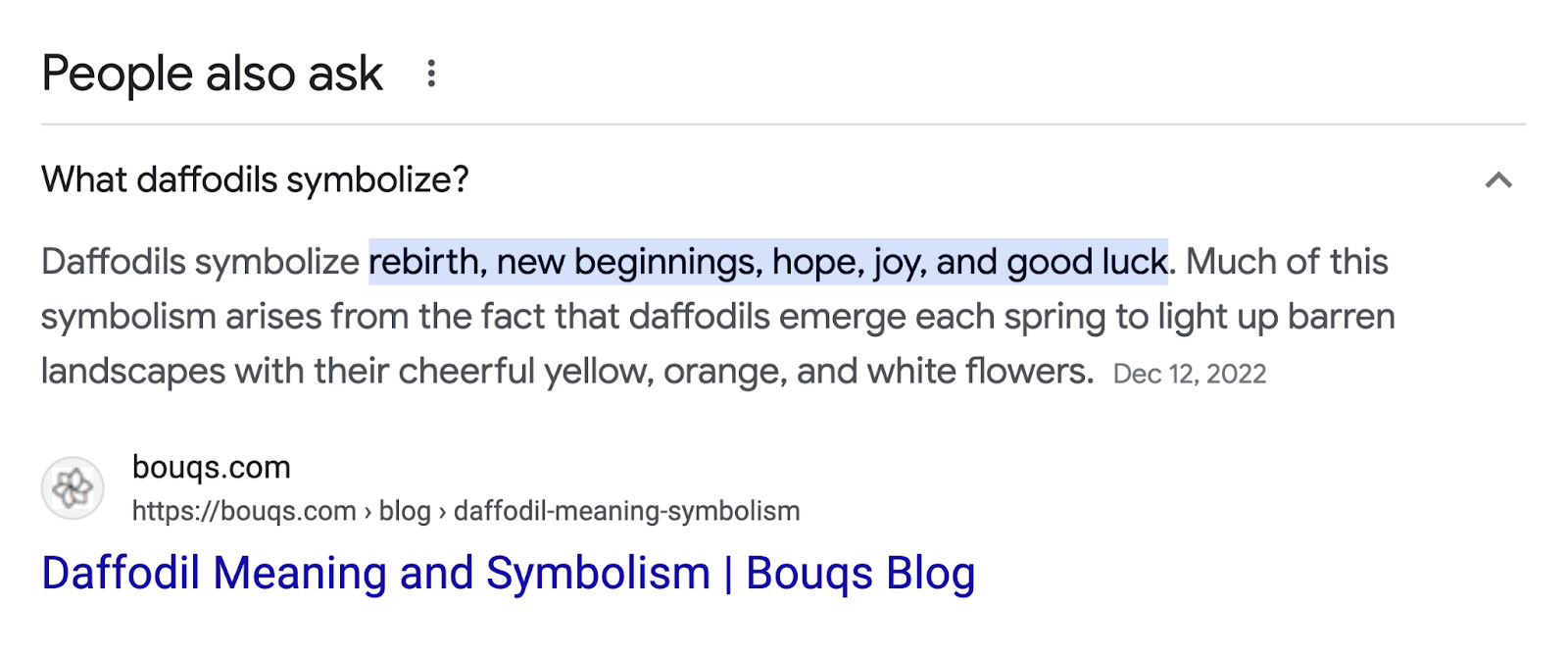
Later, we’ll clarify how to decide on one of the best competitor key phrases to make use of in your individual SEO strategy.
Examine Paid Search Key phrases for a Rival Web site
To see which key phrases are triggering your opponents’ search advertisements (or have previously), use the Advertising Research device.
Simply enter their area, select your goal location, and click on “Search.”
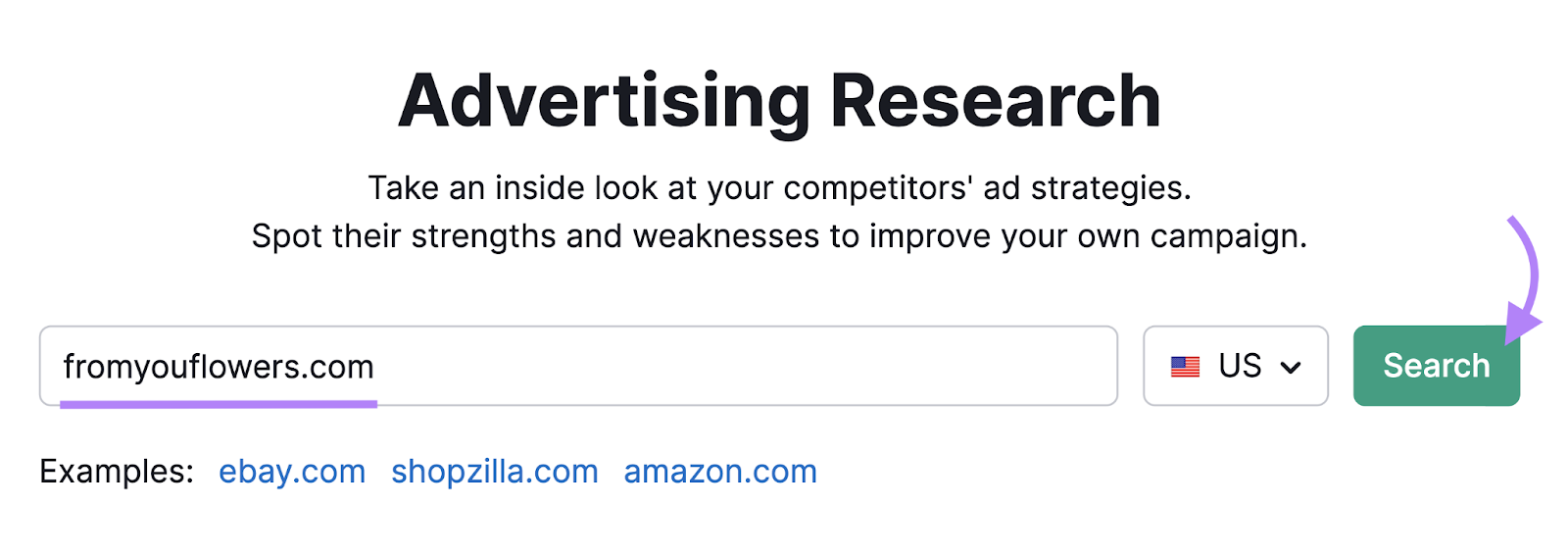
Scroll right down to the “Paid Search Positions” desk to see the complete key phrase breakdown.
The best aspect of the “Pos.” column reveals the competitor’s newest rating within the sponsored outcomes. (As per the date vary on the high.)
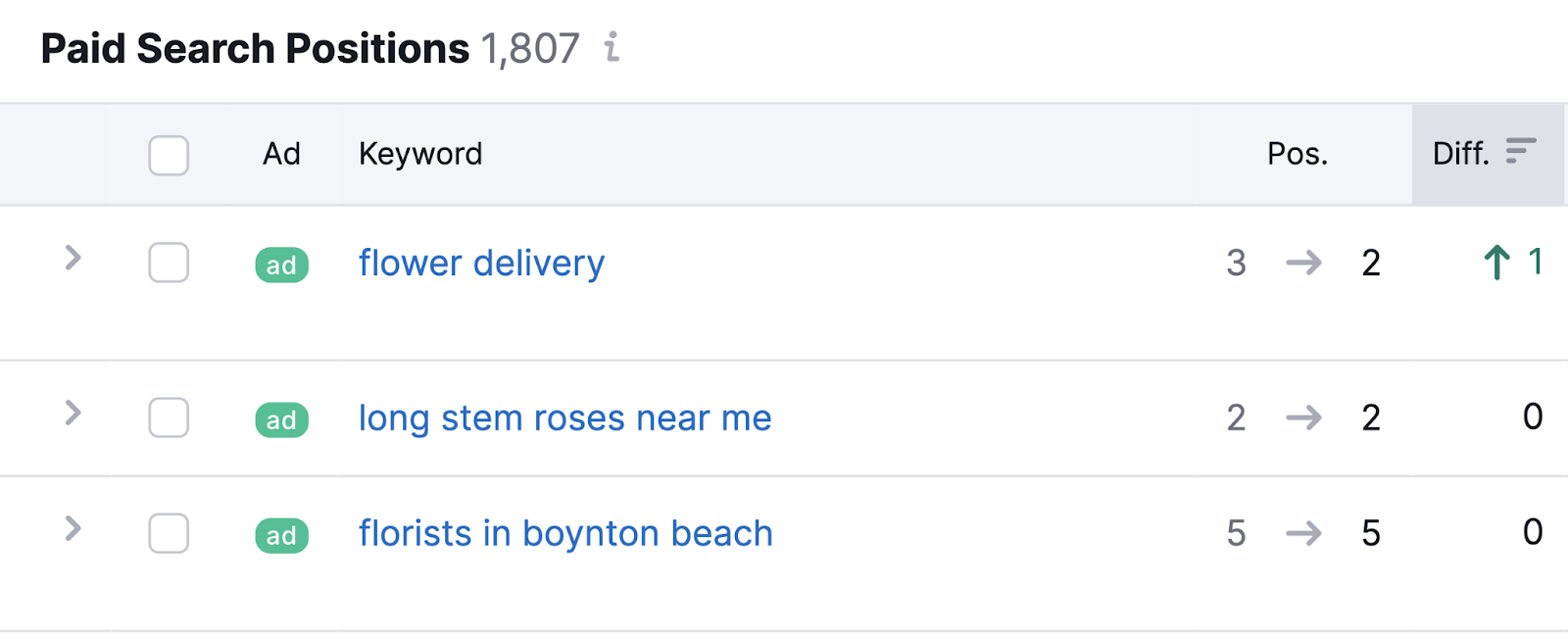
For instance, right here’s what a No. 2 advert rating appears to be like like:
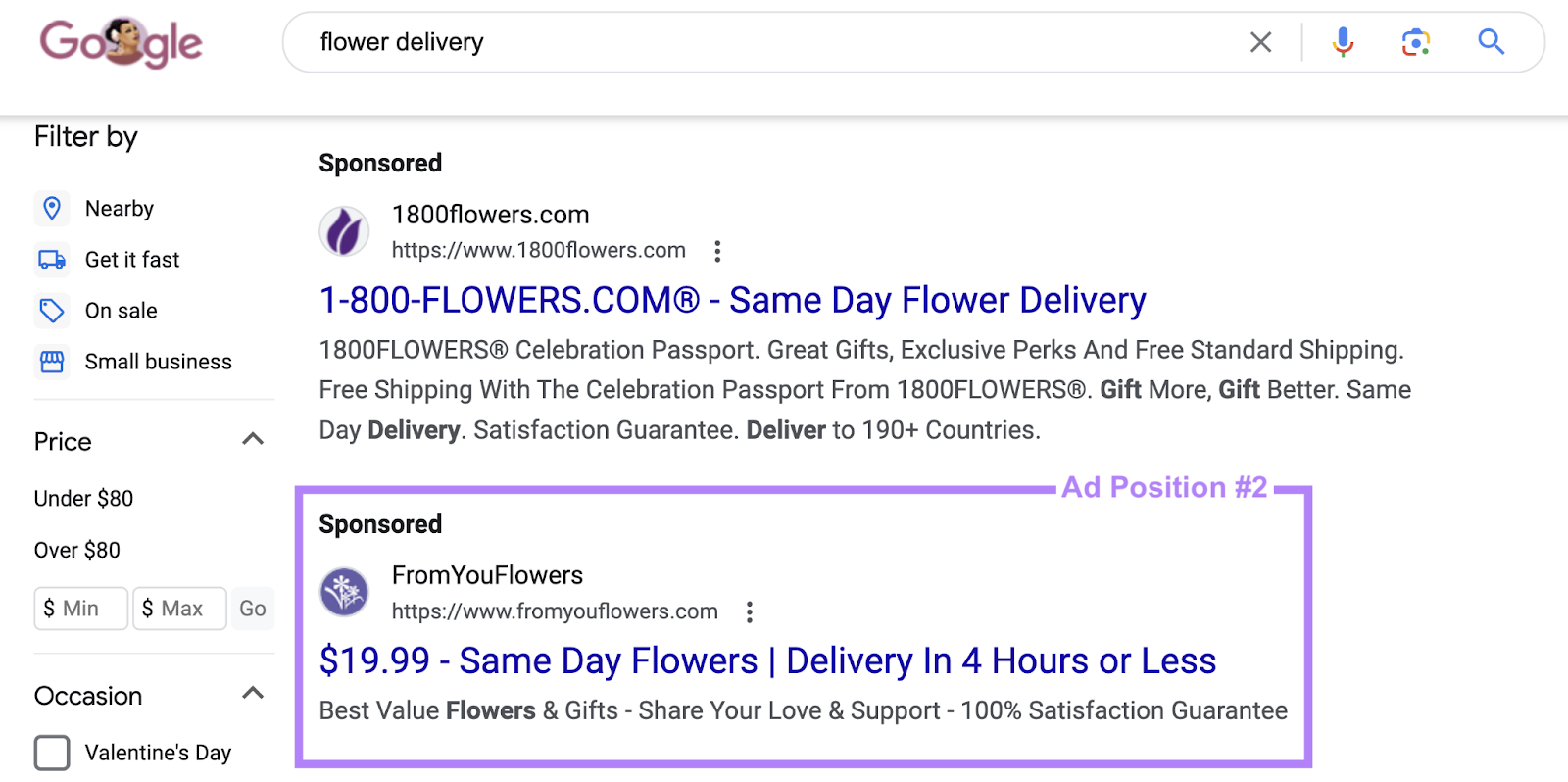
Later, we’ll clarify how to decide on one of the best key phrases in your PPC strategy.
Examine PLA Key phrases for a Rival Web site
With the PLA Research device, you’ll be able to see what key phrases set off (or have beforehand triggered) opponents’ Google Purchasing advertisements.
Enter a rival’s area, select your goal location, and click on “Search.”
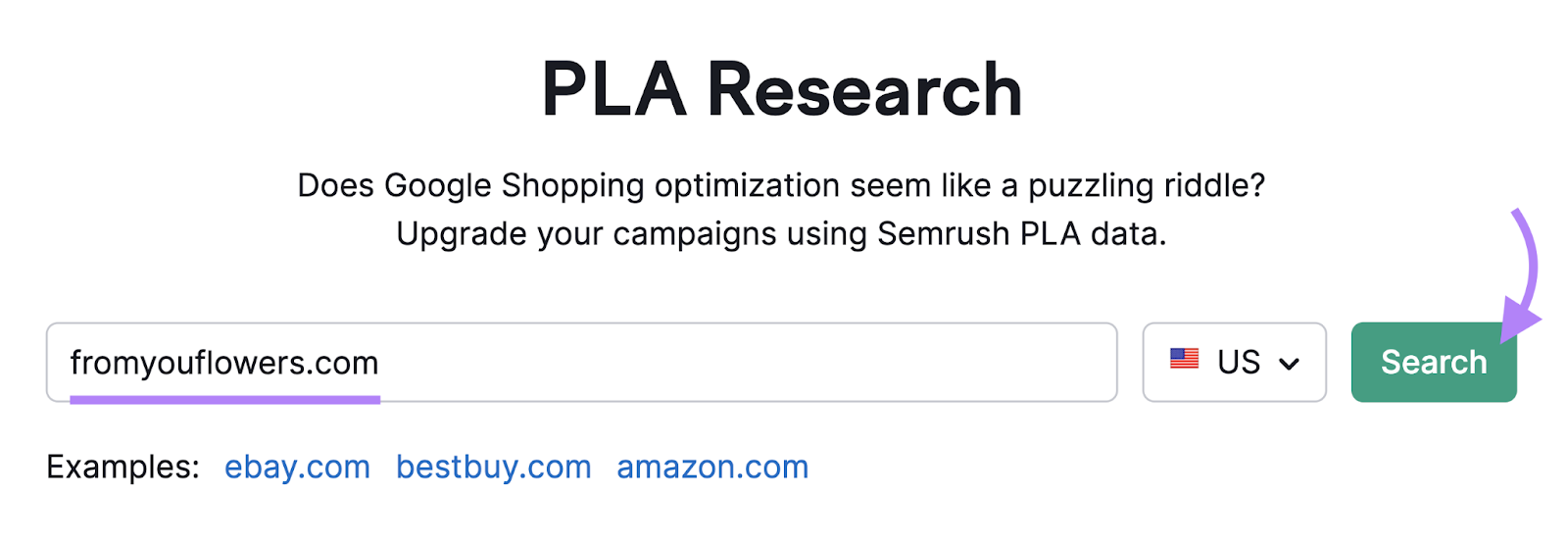
Then, scroll right down to the “PLA Positions” desk.
The best aspect of the “Pos.” column reveals their place primarily based on the latest knowledge.
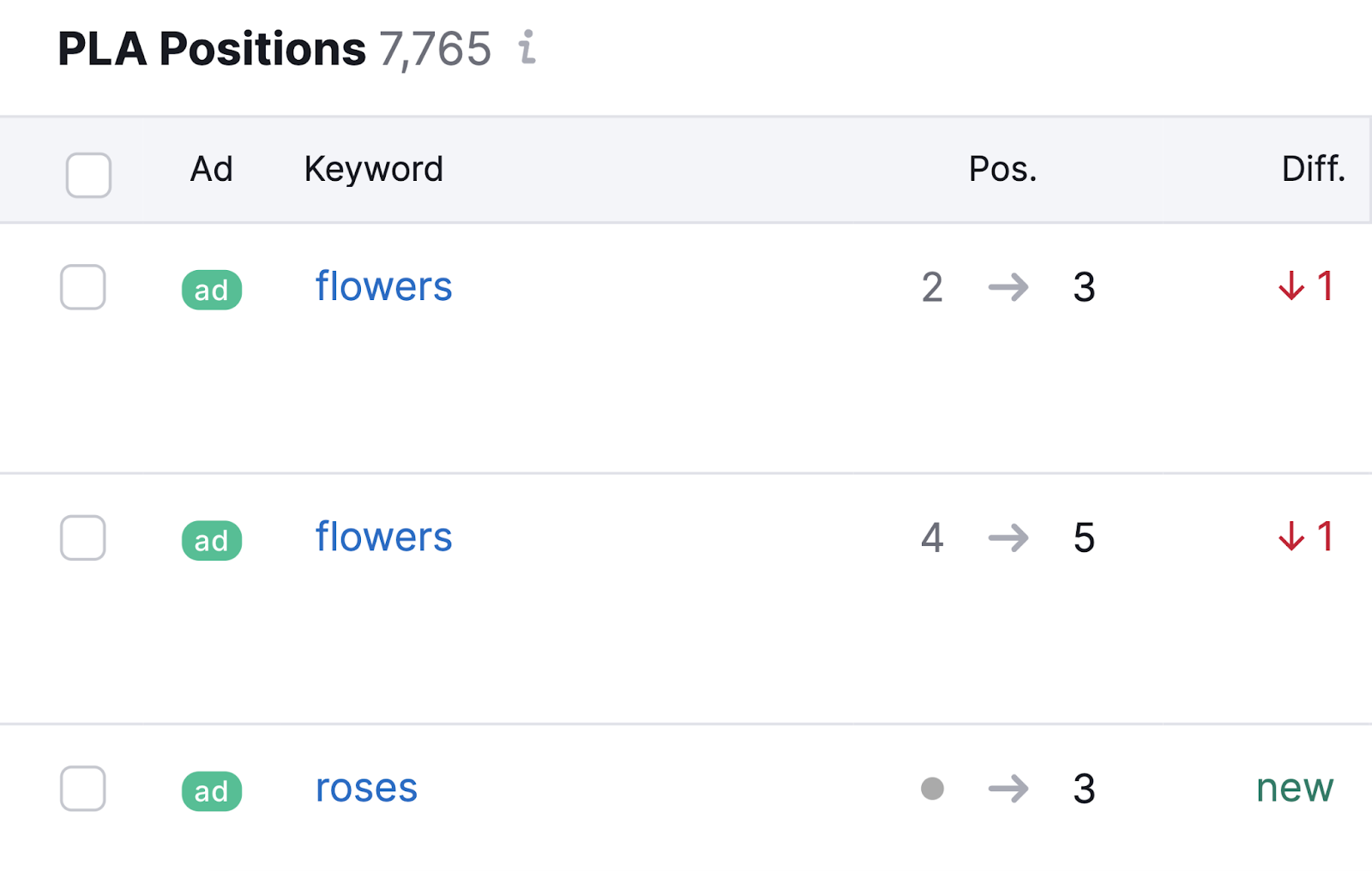
For instance, right here’s what a No. 3 rating appears to be like like:
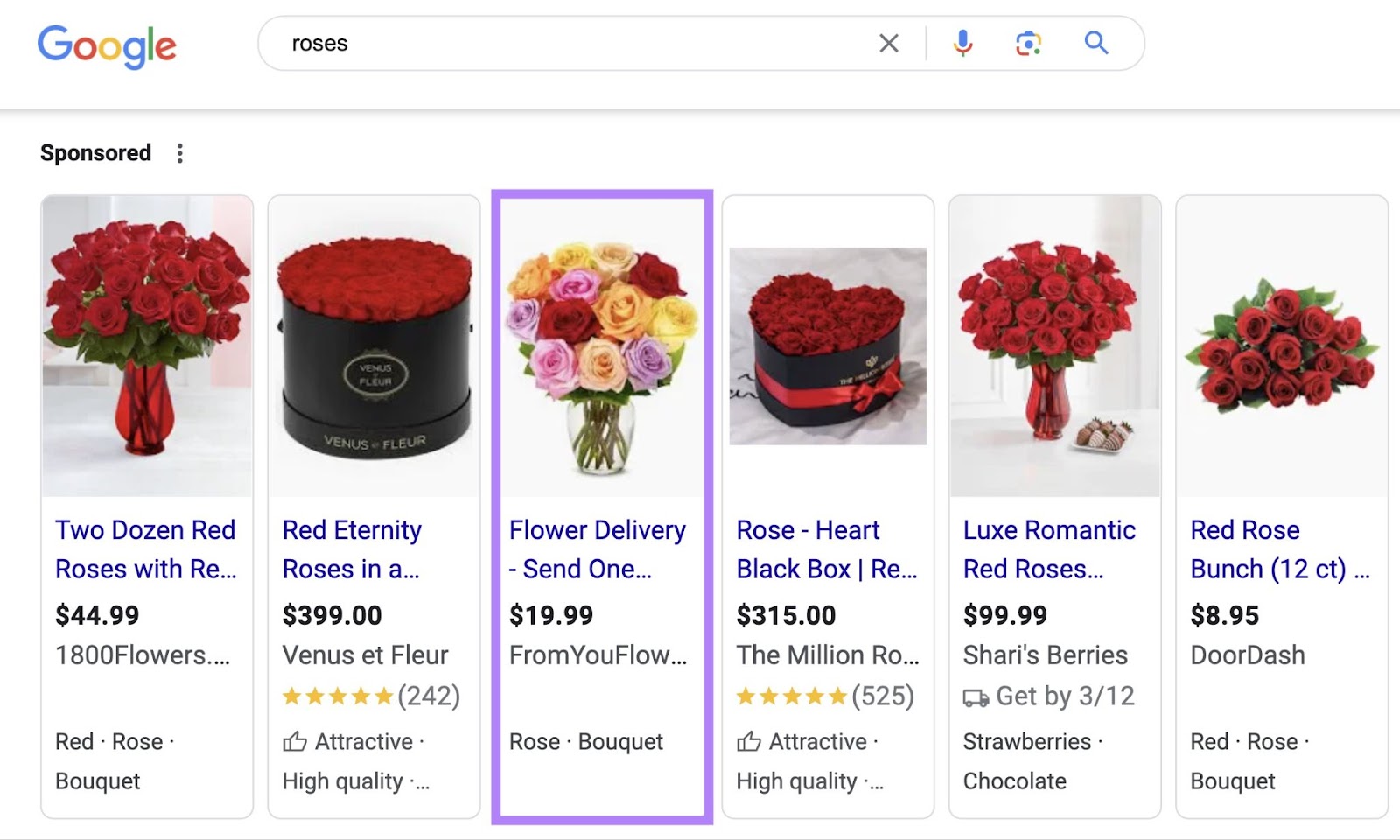
Subsequent, we’ll clarify how to decide on one of the best competitor key phrases in your campaigns.
How you can Do a Competitor Key phrase Evaluation
A competitor key phrase evaluation is the method of metrics and SERPs for competitor key phrases, with the objective of figuring out one of the best key phrases in your personal advertising and marketing technique.
Beneath, we’ll go over the steps to observe for one of the best outcomes.
Analyze Search Intent
To create content material and advertisements that carry out nicely and entice target audiences, you should perceive the search intent behind every key phrase—i.e., what the everyday searcher is on the lookout for.
For instance, individuals looking “forms of flowers” often need to find out about flowers. Not purchase them.
This implies the SERP is dominated by academic content material reasonably than product pages and advertisements.
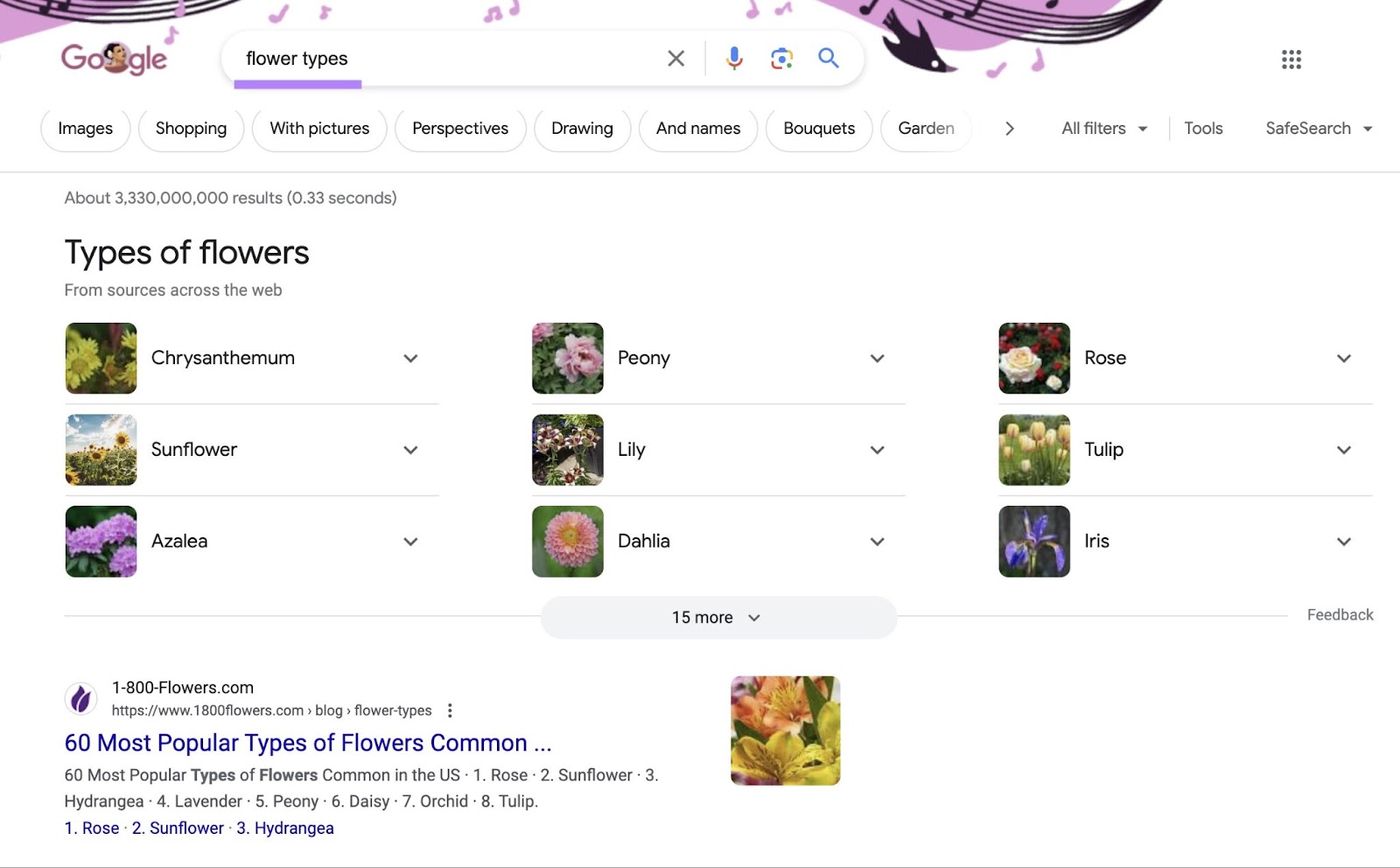
Once you analyze competitor key phrases in Semrush, you’ll be able to see the kind of intent:
|
Intent Kind |
Description |
Key phrase Instance |
|
Informational (I) |
Key phrases used to seek out info. Usually, they’re used early within the shopping for journey, so it’s uncommon that they set off ads. |
“forms of flowers” |
|
Navigational (N) |
Key phrases used to seek out particular web sites or webpages. Rivals’ branded keywords could be onerous to rank for organically. However you may need to promote on these phrases. |
“1800 flowers” |
|
Business (C) |
Key phrases used to analysis manufacturers, merchandise, or providers. Outranking opponents for these phrases helps you management the narrative round your model and seize extra gross sales. |
“greatest flowers for supply” |
|
Transactional (T) |
Key phrases individuals use once they’re able to take motion (e.g., make a purchase order). These are the preferred key phrases for promoting, however natural rankings are extraordinarily invaluable, too. |
“flowers close to me” |
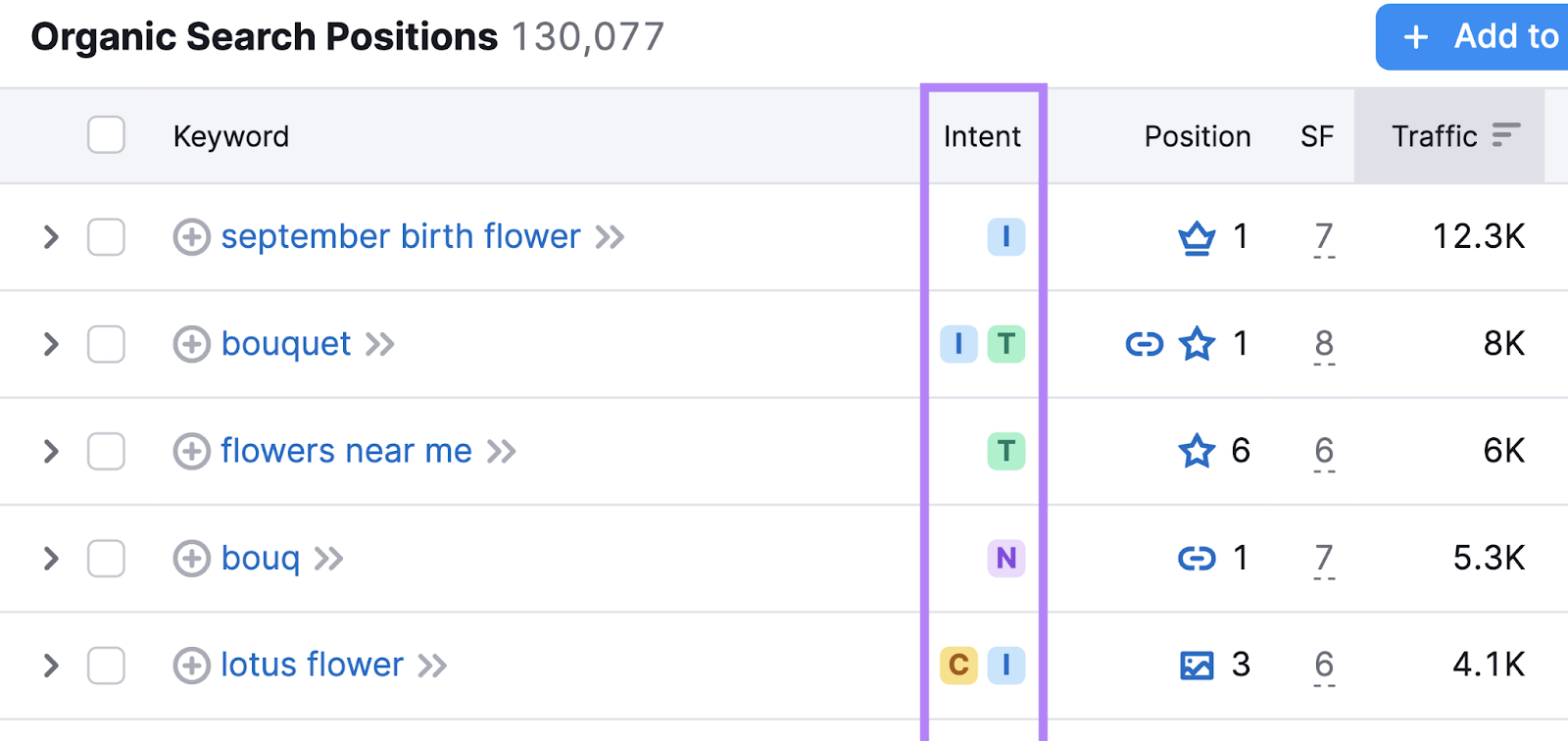
For additional perception into search intent, see what outcomes seem on the SERP itself.
You’ll be able to view the non-personalized ends in your goal location by way of Keyword Overview (and another instruments). Simply click on the “View SERP” button or the icon that appears like this:
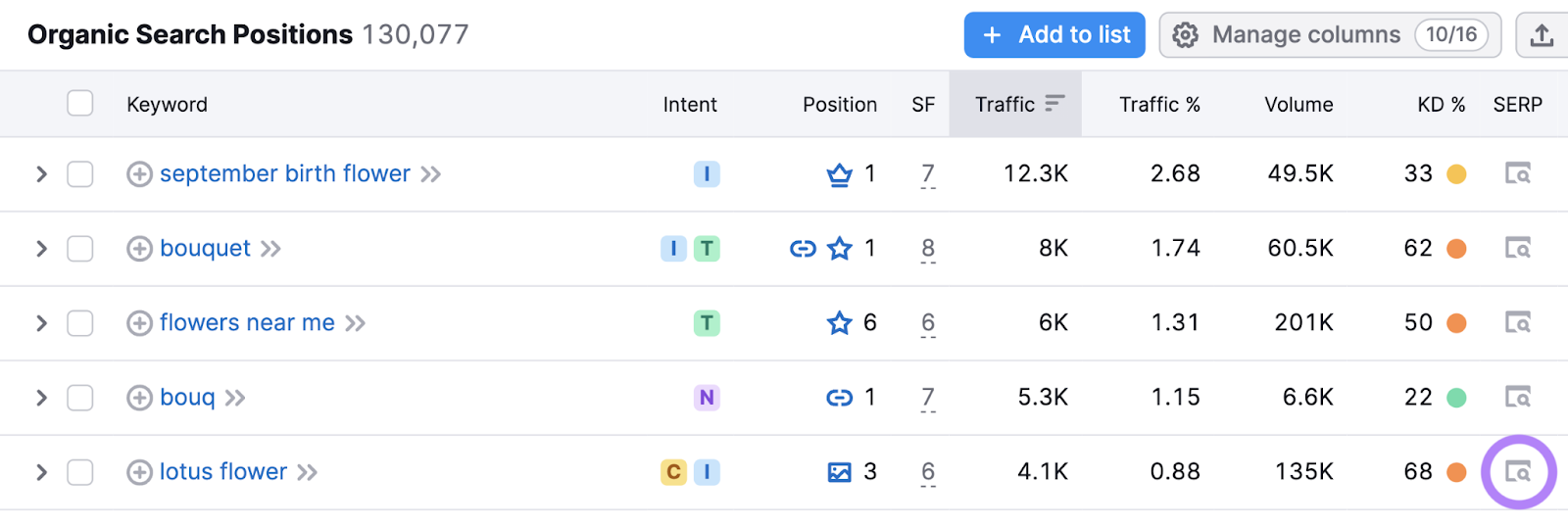
When conducting your SERP analysis, ask questions like:
- What forms of websites are rating?
- What forms of content material are rating?
- Will ensuing visitors contribute towards my enterprise objectives?
This may provide help to decide in case your website is an effective match for the key phrase. And vice versa.
Study Search Volumes
Search volume is the typical variety of month-to-month searches a key phrase receives. The upper the key phrase’s quantity, the upper a search end result’s potential attain.
Once you’re doing competitor key phrase analysis in Semrush, you’ll be able to simply discover Google search volumes in your chosen location.
For instance, our database reveals that “pink tulips” will get 9,900 searches per thirty days within the U.S.:

Whereas quantity is necessary to contemplate when selecting key phrases, you shouldn’t at all times go for the higher-volume key phrases and ignore the lower-volume ones.
Why?
Typically, individuals search for a similar factor in many alternative methods. This implies the search demand round a selected subject could be a lot increased than one key phrase’s quantity makes it appear.
(Later, we’ll clarify find out how to group your key phrases collectively and calculate the mixed quantity.)
Plus, key phrases with excessive search volumes have a tendency to draw fierce competitors. As we’ll focus on within the following sections.
Take a look at Key phrase Issue Scores
Keyword difficulty measures how onerous it’ll be to earn a excessive natural rating for a given key phrase.
It’s an necessary metric in Search engine marketing. Since you don’t need to waste time concentrating on key phrases you’re unlikely to rank extremely for.
In any case, the highest natural end result will get a mean click-through fee (CTR) of over 22%. However beginning in place six, common click-through charges drop to lower than 5%.
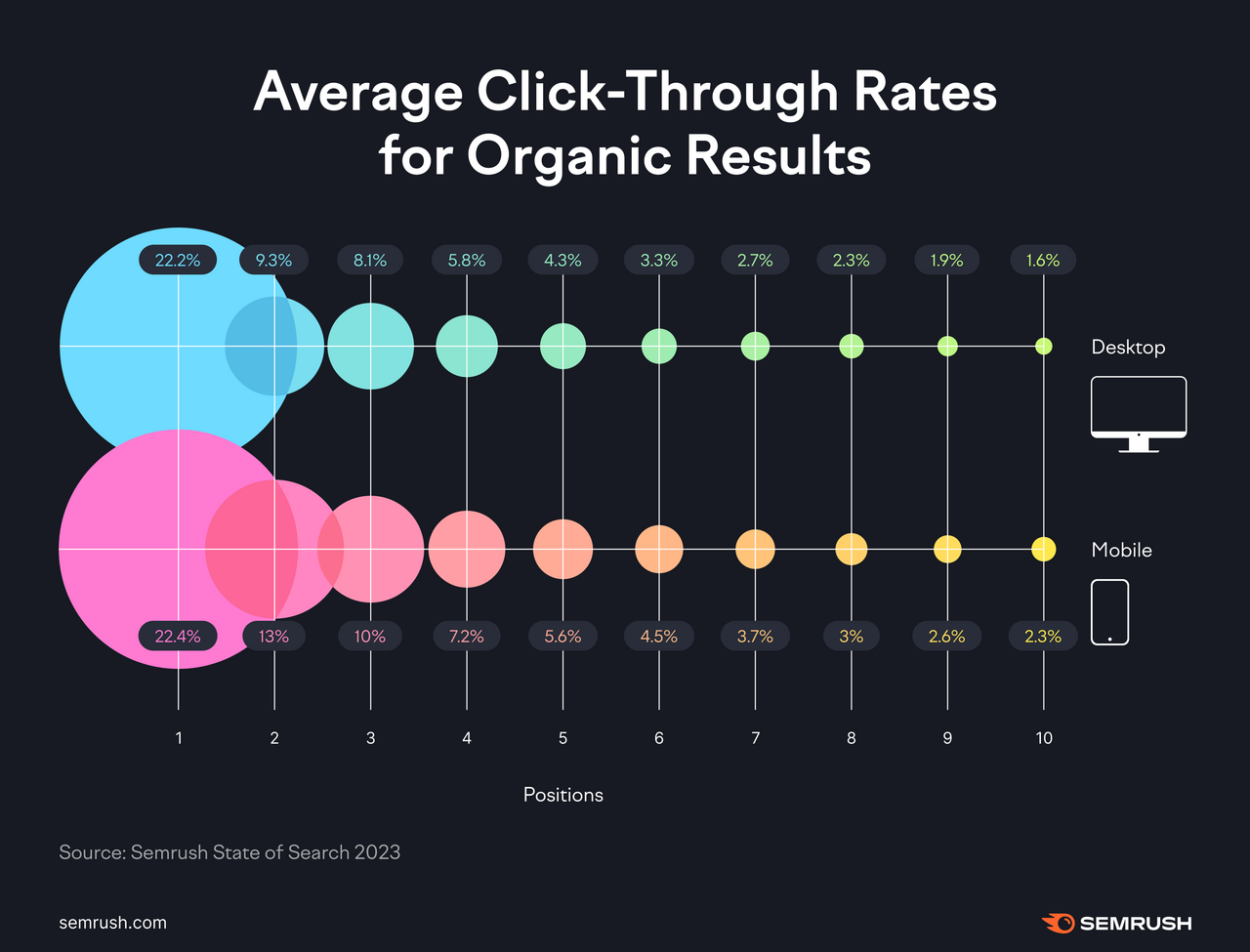
Semrush measures key phrase issue (KD%) out of 100. And splits scores into six classes:
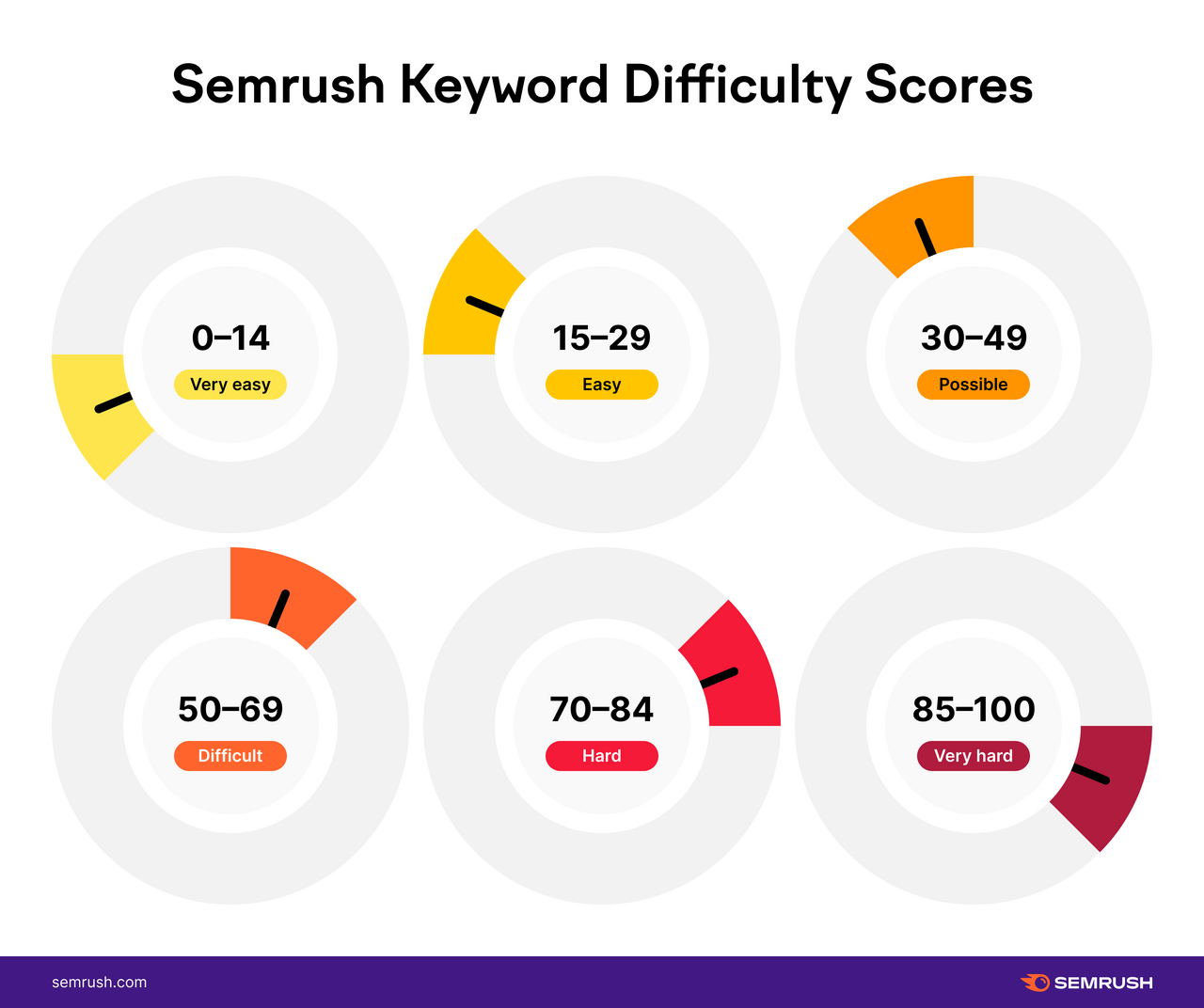
Right here’s what that knowledge appears to be like like within the Keyword Gap device:

Usually, key phrase issue scores correlate strongly with search volumes (extra on these subsequent) and the extent of buy intent behind the key phrase. As a result of standard key phrases which are prone to generate gross sales entice extra competitors.
For instance:
- “flower supply” has 246K month-to-month searches, transactional intent, and a 71% key phrase issue rating
- “july beginning flower” has 49.5K month-to-month searches, informational intent, and a 21% key phrase issue rating
Think about Value Per Click on
Cost per click (CPC) is how a lot you’ll pay when a person clicks in your advert.
The CPC estimates in Semrush provide help to decide which competitor key phrases are inside your PPC advertising and marketing finances.

However CPC can be a helpful metric in Search engine marketing. As a result of it signifies how invaluable the key phrase is.
In any case, advertisers are unlikely to spend cash on clicks that don’t generate a revenue.
For instance, “flowers delivered” has an estimated CPC of $4.09. As a result of individuals who click on by means of are comparatively prone to buy a bouquet.
Alternatively, “various kinds of flowers” has an estimated CPC of $0.24. As a result of individuals who click on by means of are comparatively unlikely to make a purchase order.

So, a florist ought to in all probability goal “flowers delivered” earlier than “various kinds of flowers.” Particularly contemplating that it has a decrease issue rating, too.
Consider Aggressive Density
Semrush’s aggressive density (Com.) metric gauges how standard a key phrase is amongst search advertisers.
It’s measured from 0-1, with scores above 0.80 suggesting a excessive stage of competitors.

In PPC, a excessive aggressive density rating suggests it’ll be tougher to promote on the SERP. As a result of a number of websites are competing for a similar advert house.
In Search engine marketing, a excessive aggressive density rating suggests that you just’ll be competing towards a number of advertisements on the SERP. And this may increasingly negatively have an effect on the variety of natural clicks you get.
But it surely’s necessary to notice that many customers want natural outcomes over advertisements.
How you can Use Competitor Key phrases
Listed here are three steps to observe after choosing the competitor key phrases you need to goal:
1. Create Key phrase Clusters
Keyword clusters are teams of key phrases that share the identical search intent—e.g., “flower supply” and “flower supply service.”
And creating key phrase clusters:
- Lets you goal a number of key phrases with each bit of content material or advert marketing campaign
- Decreases the chance of making near-duplicate website content, which is unhealthy for Search engine marketing
- Provides you a fuller understanding of the demand and intent round every subject
You’ll be able to cluster competitor key phrases (and different goal key phrases) routinely with Semrush’s Keyword Manager.
First, you’ll want to save lots of your key phrases into lists:
- If you happen to’re utilizing a device like Keyword Gap or Organic Research, use the checkboxes to pick out your goal key phrases. Then, click on “+ Add to key phrase record” and select or create a listing.
- In any other case, go to Key phrase Supervisor, click on “create an everyday record,” and add your key phrases manually. Exporting your key phrase analysis to a spreadsheet first could make this course of simpler.
When a key phrase record is prepared, open it and click on “Cluster this record.”

The device will routinely group your key phrases by subject.
For every cluster, you’ll be able to see the typical issue rating and mixed search quantity. Which may help you prioritize your efforts.
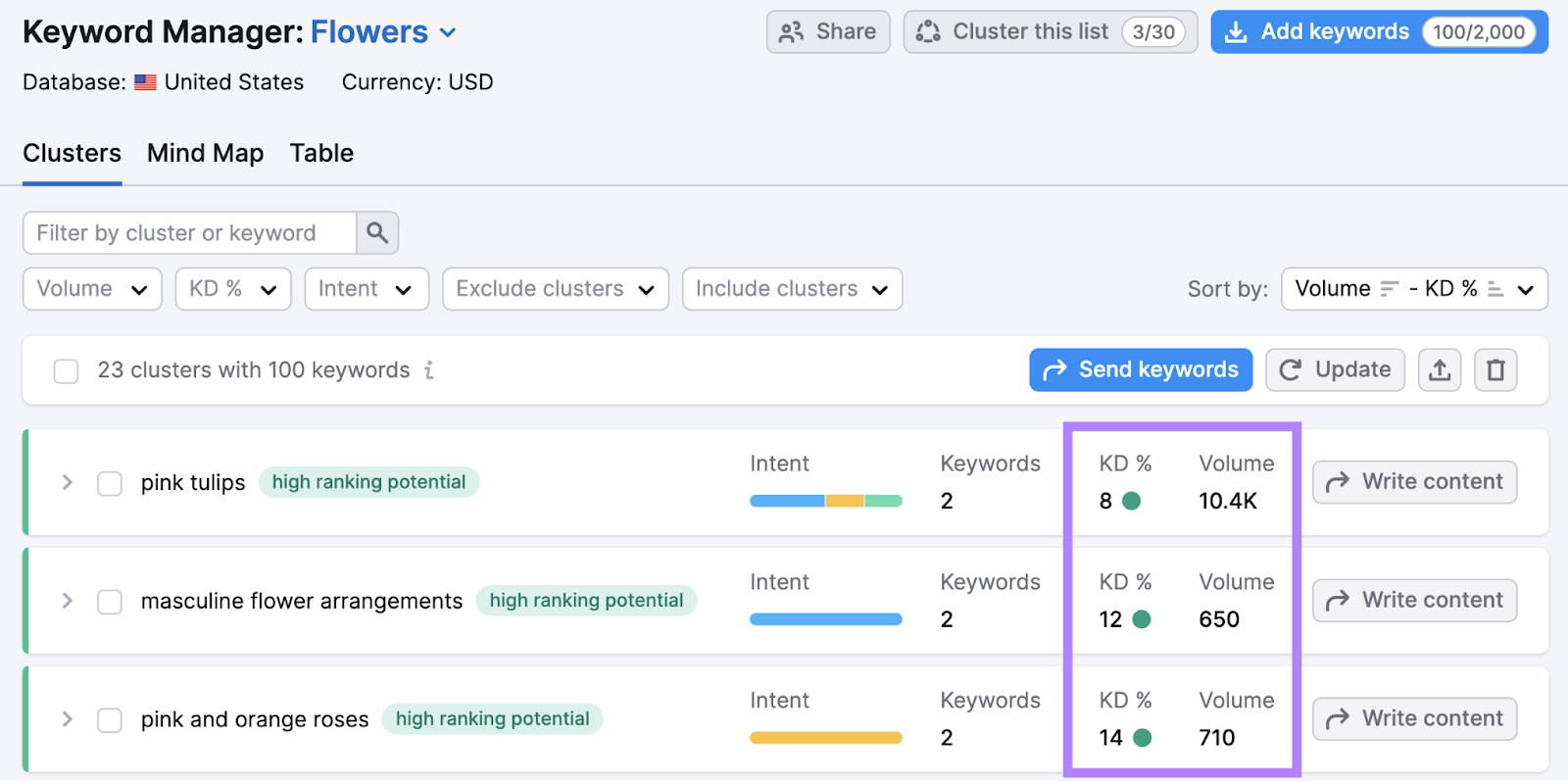
Now, you’re able to create Search engine marketing-optimized content material or advert campaigns round every key phrase group.
2. Enhance on Your Rivals’ Content material
For one of the best likelihood of outranking your opponents, you could create content material or advertisements which are higher than theirs.
Ideally, you need to create content material that’s one of the best of its form.
So, see what you’re up towards.
Evaluating Natural Outcomes
If you happen to search for a competitor key phrase within the Keyword Overview device, you’ll be able to entry the top-ranking natural outcomes from the “SERP Evaluation” part.
Simply click on the icons that seem like this:
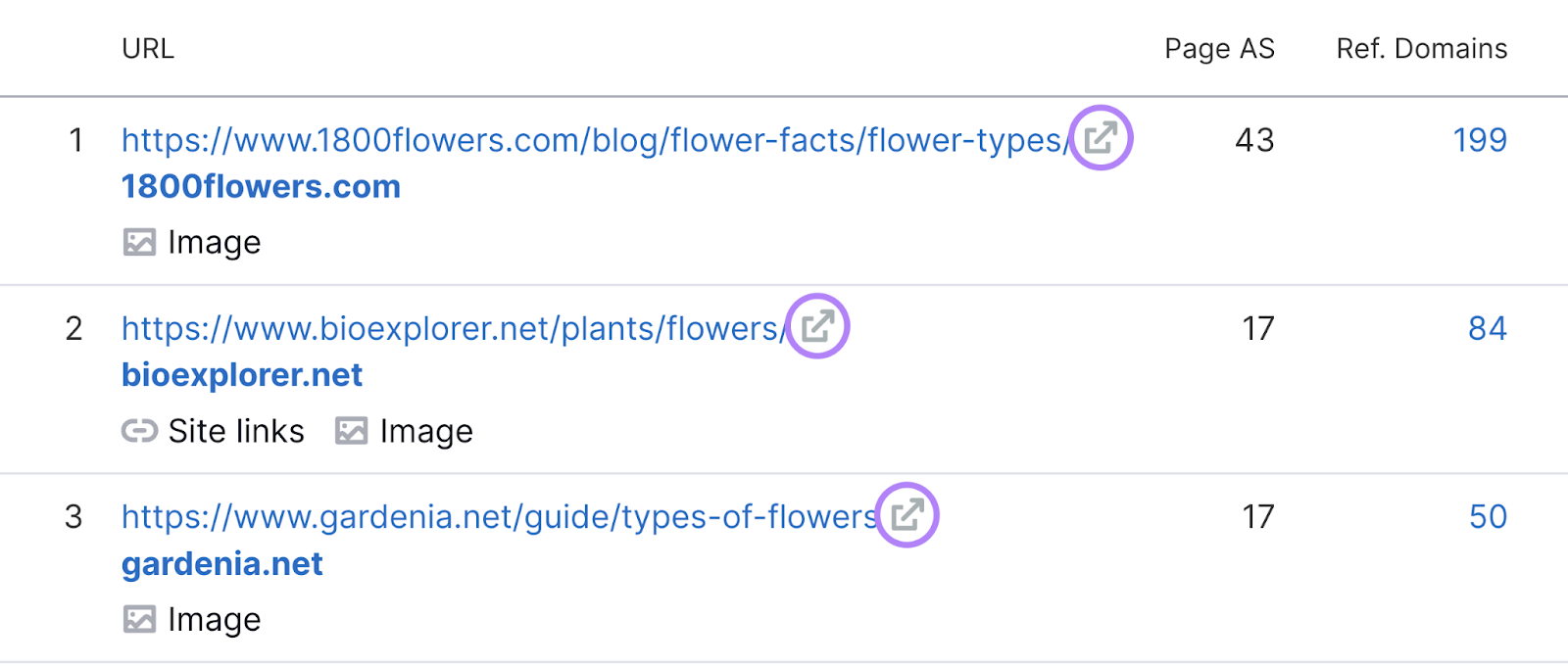
Then, analyze the standard of the content material. By asking your self questions like these:
- Is the content material straightforward to learn and perceive? Is it correct and updated?
- What subtopics does the content material cowl? What’s the phrase depend?
- Are HTML heading tags used to construction the web page? What sort of format does the content material observe?
- How are related key phrases used throughout the web page?
- Are there internal links to different pages on the location? Or external links to helpful sources?
- Has the creator used bullet factors, pictures, charts, movies, and so on. to assist customers take in info extra simply? Is there a greater strategy to current this info?
- Do the title tag and meta description (the web page title and abstract that may seem in search outcomes) embrace key phrases? How are you going to make your end result stand aside on the SERP?
- Does the content material display Expertise, Experience, Authoritativeness, and Trustworthiness (E-E-A-T)?
This type of evaluation helps you establish strengths you’ll be able to emulate. And weaknesses you’ll be able to capitalize on.
For extra recommendation on creating content material that ranks extremely, take a look at our information to quality content.
Evaluating Paid Outcomes
You’ll be able to enter a competitor key phrase into the Ads History device to see what search advertisements have ranked nicely in your goal location.
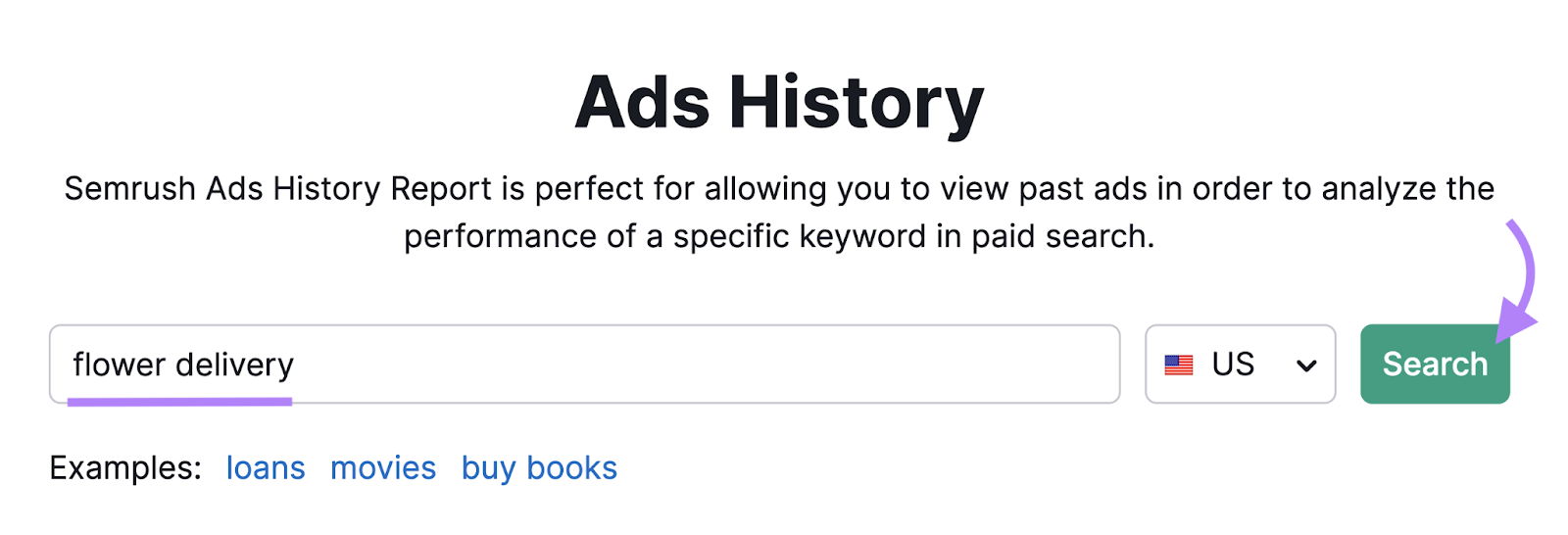
The numbered packing containers symbolize every advertiser’s highest rating place by month. And you may click on these packing containers to see what ad copy was used.
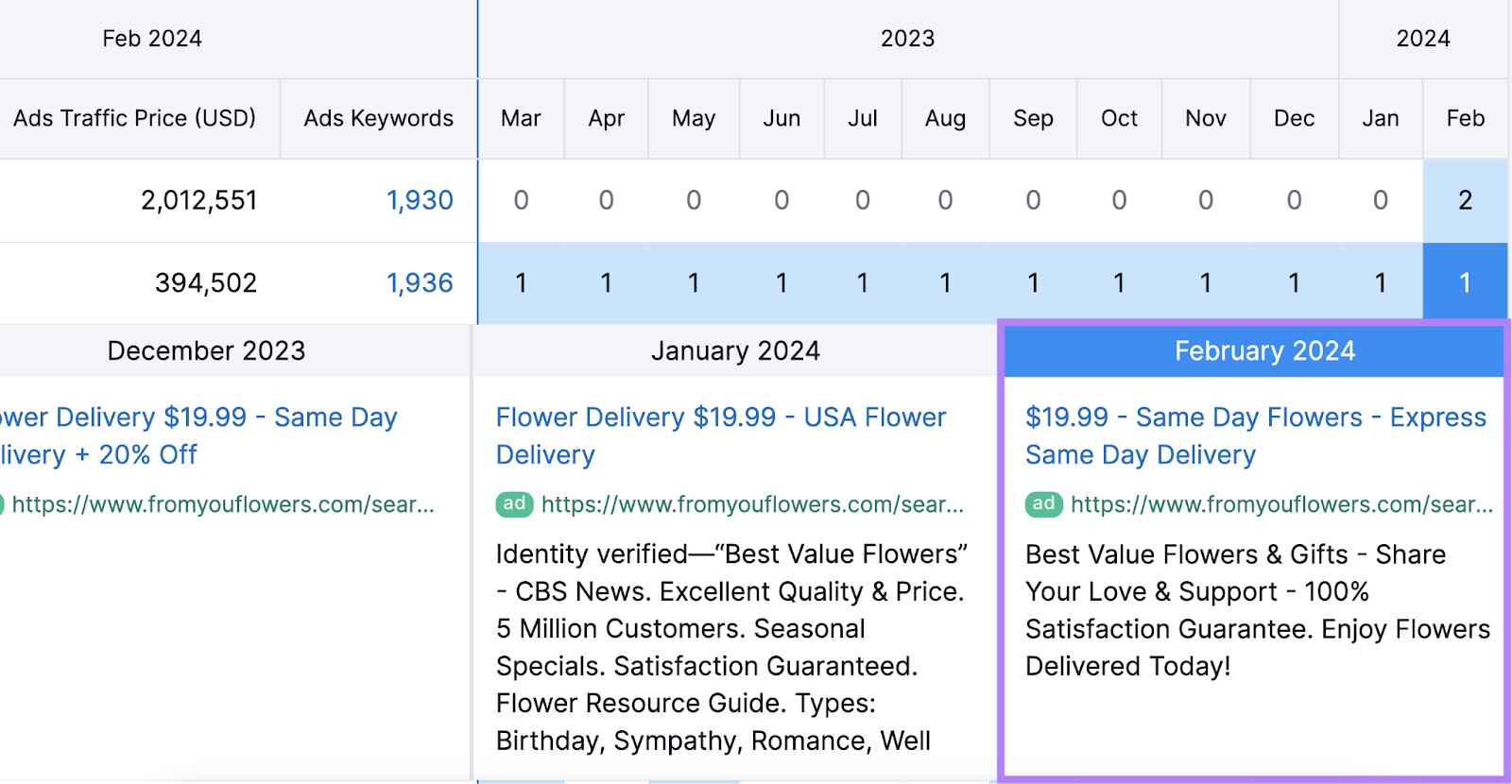
You can too go to the advert’s landing page.
Simply click on the blue hyperlink to get extra inspiration in your marketing campaign.
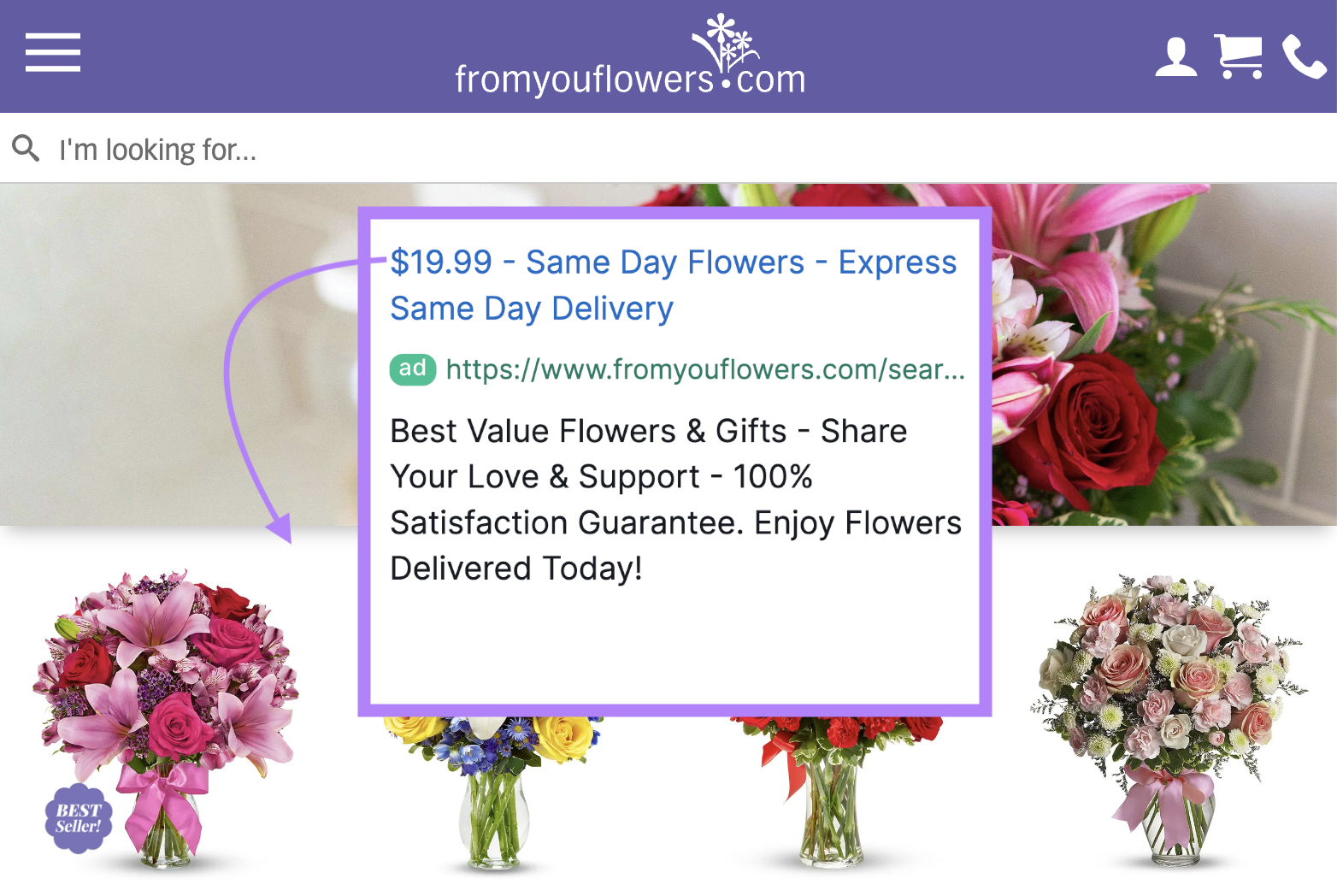
To be taught extra about incomes excessive advert rankings, take a look at our guides on Quality Scores and keyword bidding.
3. Observe Your Rankings
You’ll be able to monitor your natural and paid key phrase rankings with our Position Tracking device. And see how your efficiency compares towards opponents’.
After establishing and importing all of your competitor key phrases, click on the “Add” hyperlink on the high of the web page.

Then, add or select the domains of as much as 20 opponents.
And click on “Save modifications.”
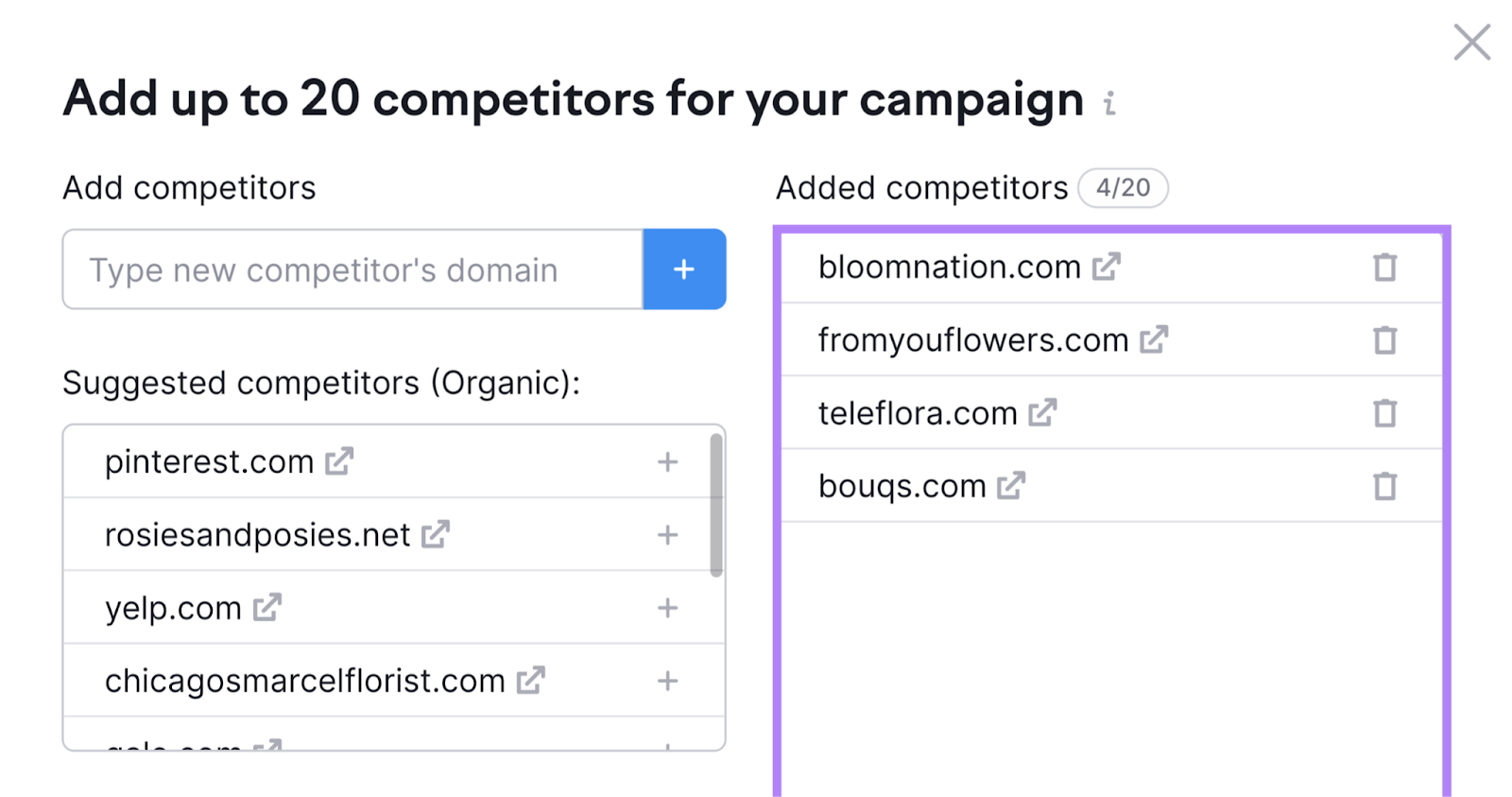
When that’s carried out, head to the “Overview” report.
And use the “Add area” drop-downs to pick out as much as 4 opponents.
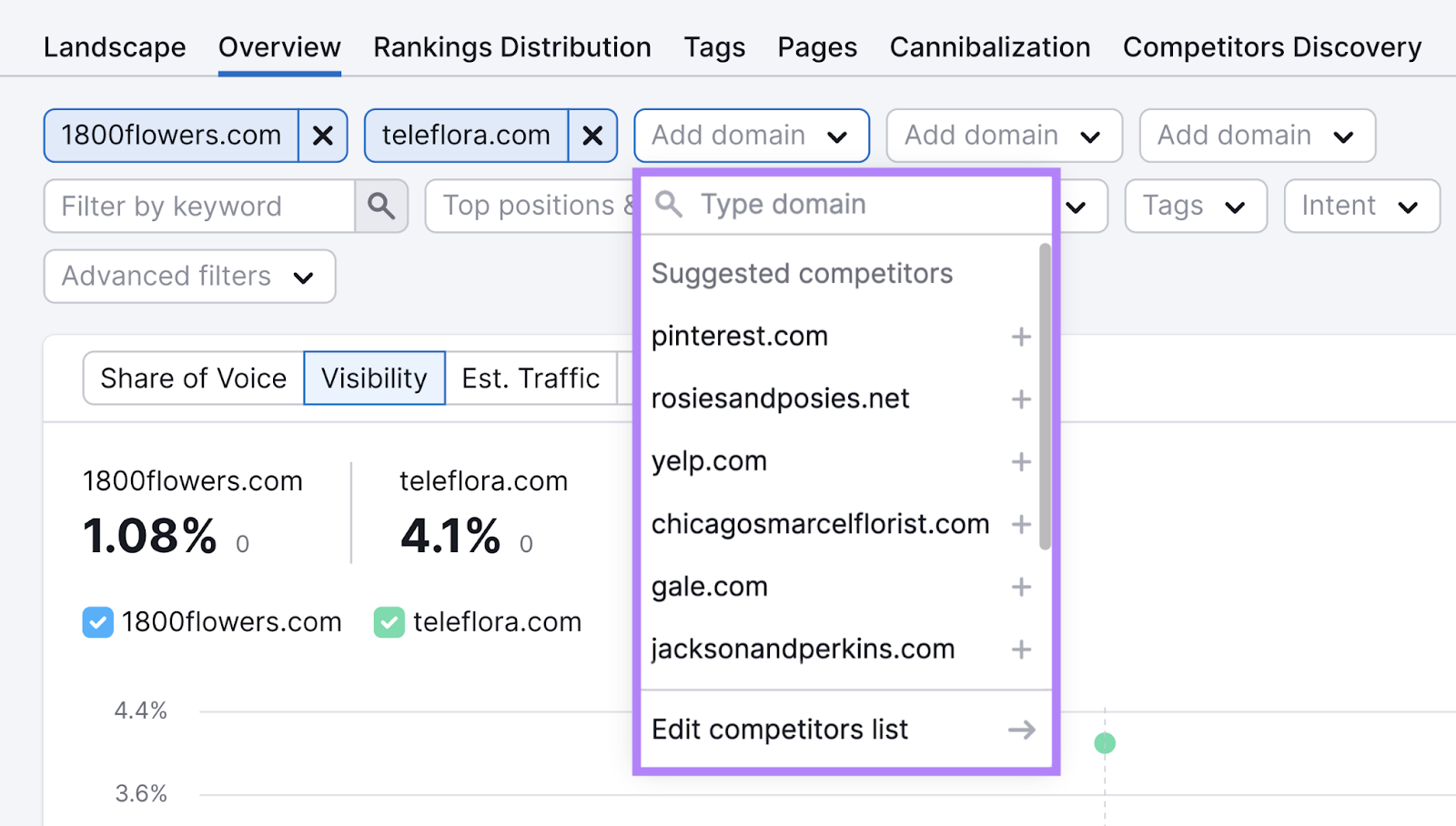
Now, you’ll be able to see the way you’re performing towards your chosen opponents.
You’ll see natural outcomes by default, however you’ll be able to swap to Google Adverts knowledge by way of the cog menu within the higher proper.
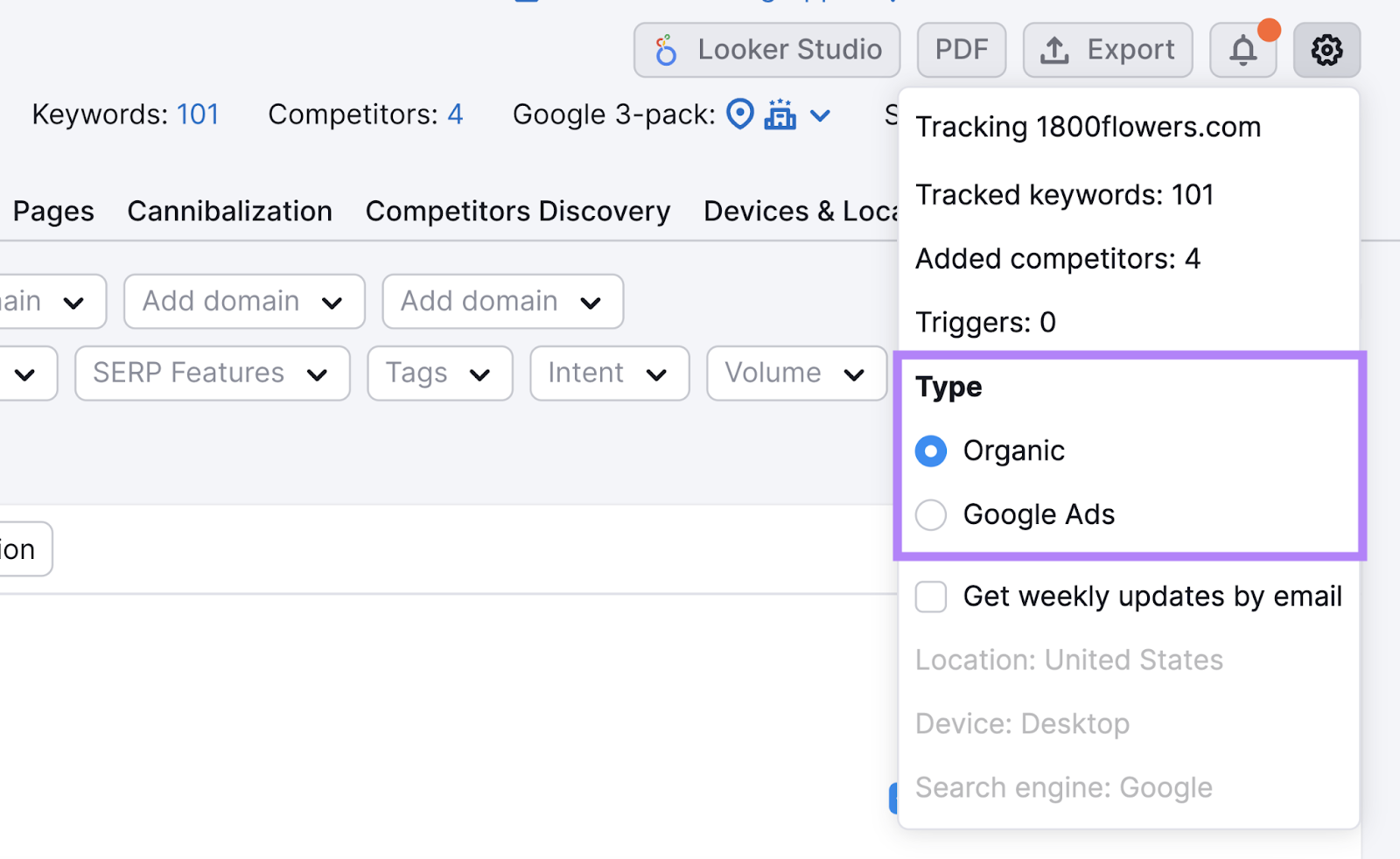
On the high of the report, numerous graphs provide help to examine your general efficiency.
For instance, the “Visibility” graph reveals how prominently every website ranks for the tracked key phrases. (A rating of 100% means a place 1 rating for each key phrase.)
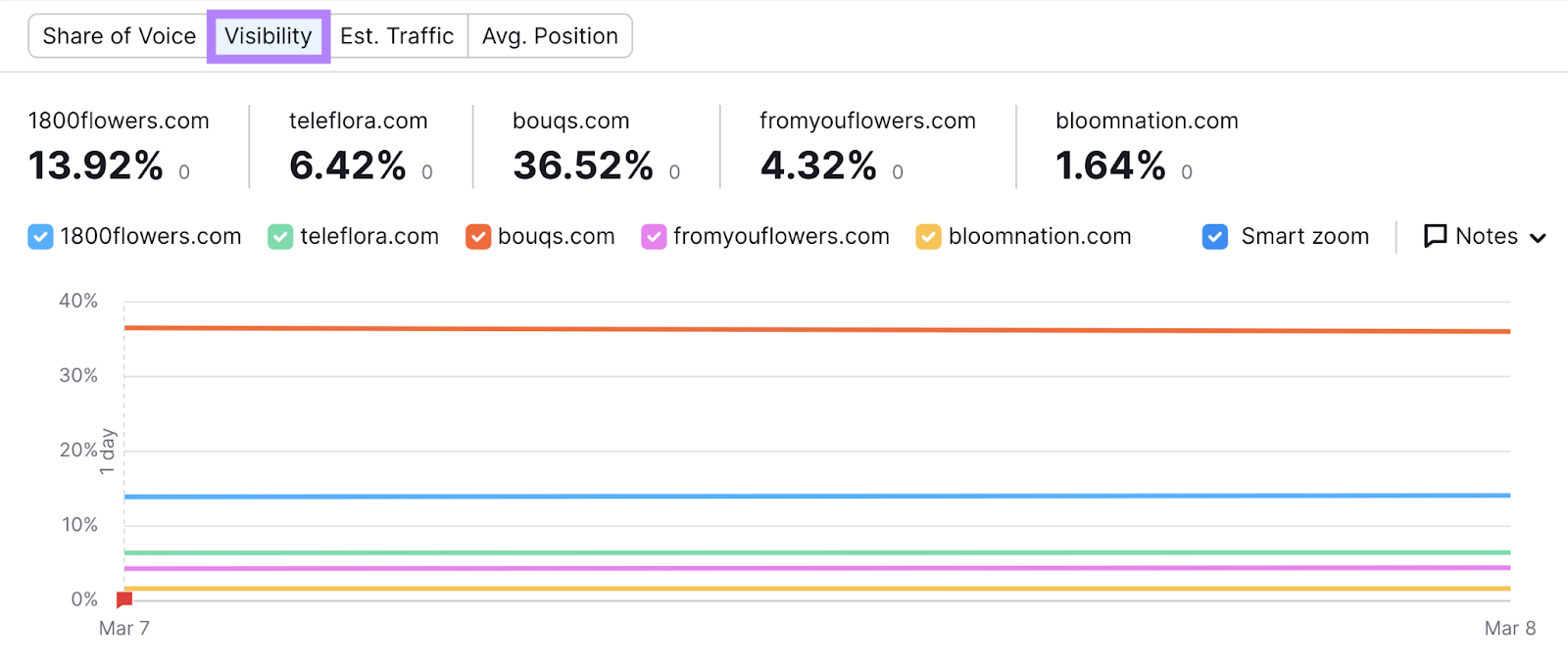
To see a breakdown of tracked key phrases, scroll right down to the “Rankings Overview” desk.
You’ll see every website’s earlier and present rating. (Primarily based on the time vary chosen on the high.)
There are additionally icons to point out possession of SERP options.
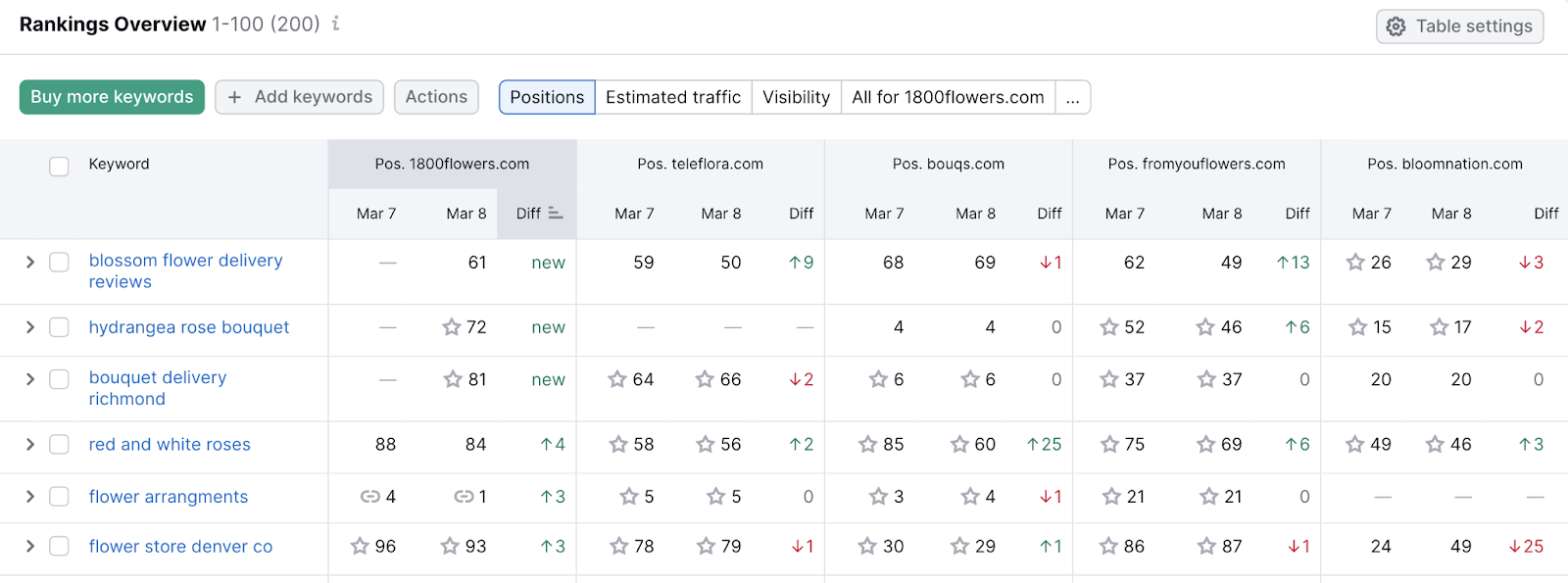
This makes it straightforward to see whether or not you’re outranking your opponents. And what route every website’s rankings are getting in.
Simply keep in mind that it can take months to improve your SEO rankings. And it’s regular for positions to fluctuate.
Begin Outranking Your Rivals
Semrush gives every little thing you could outrank your opponents in search.
To get began, enter your and your rivals’ domains into the Keyword Gap device. And see what competitor key phrases you’re lacking out on.




